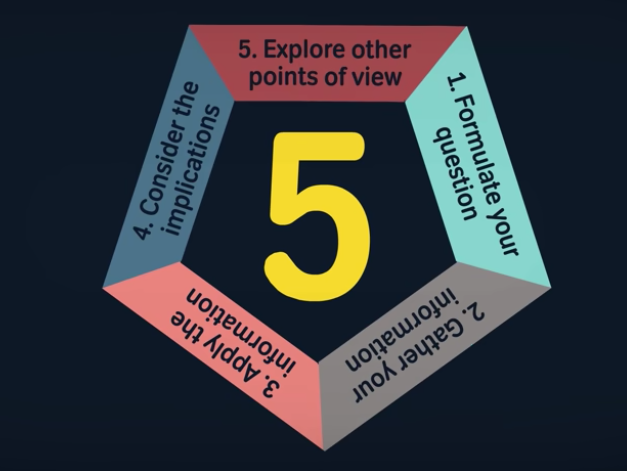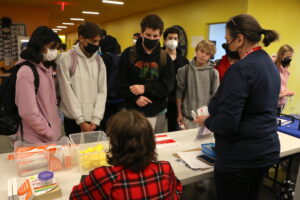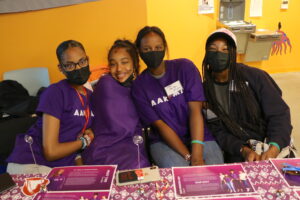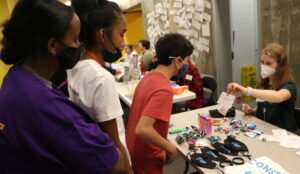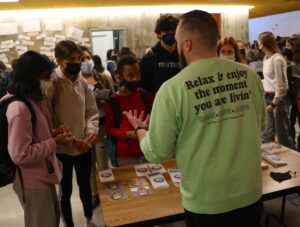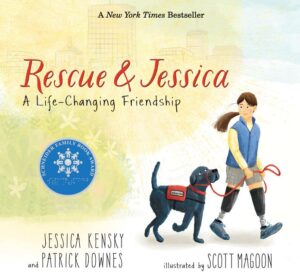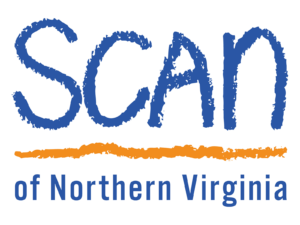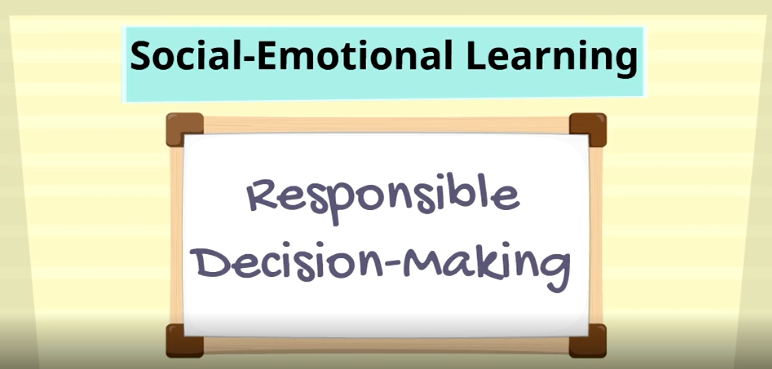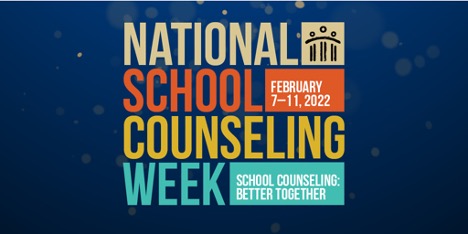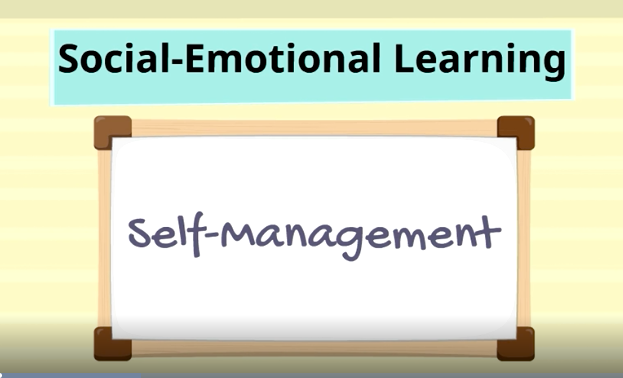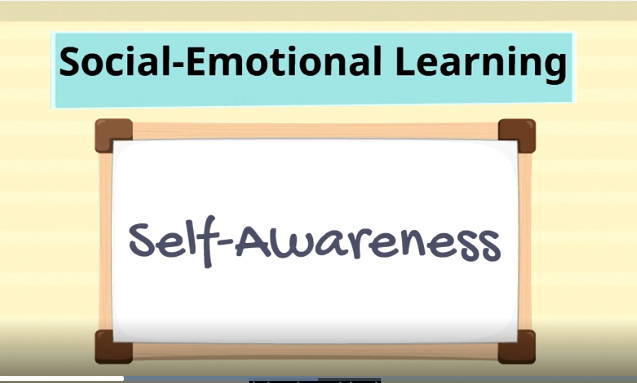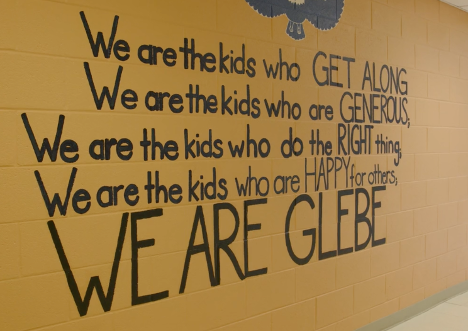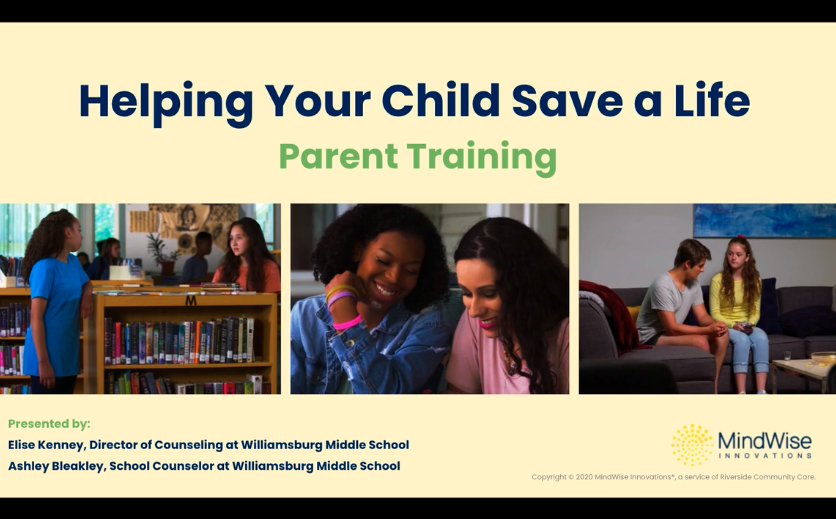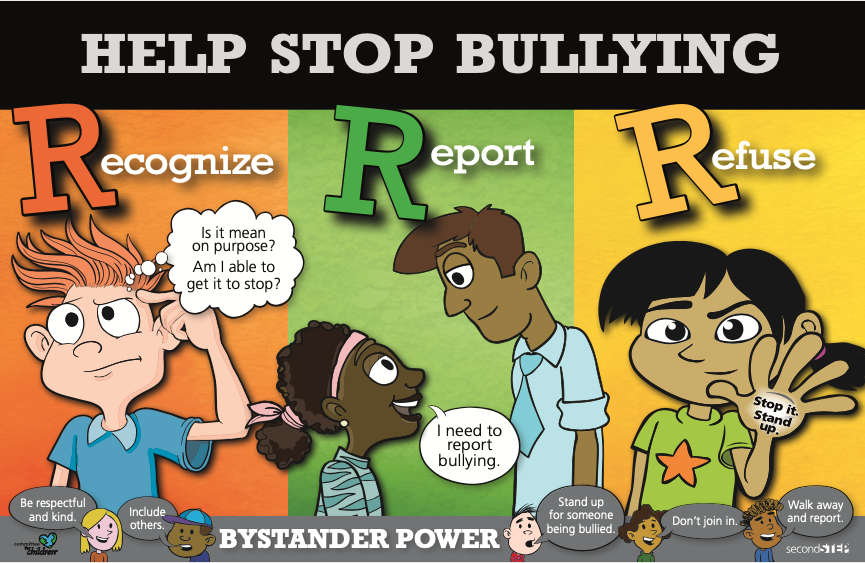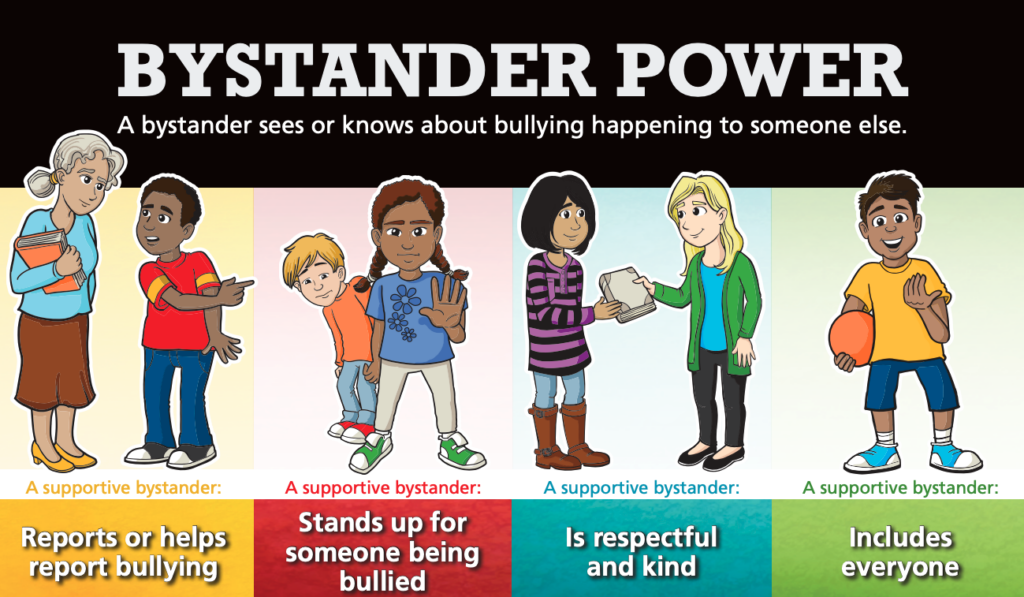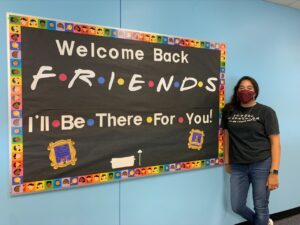Student Services is sending out a newsletter monthly starting in the 2021-22 school year. The newsletter covers topics around Social-Emotional Learning, mental health support, and other relevant topics and resources.
Student Services Newsletter June 2022
The SEL theme for June is Responsible Decision-Making. Read more for ways to work on these skills with your child and why critical thinking is the foundation of responsible decision-making. As we prepare for summer break, make sure to note the upcoming virtual support groups for parents and the Cigna Student School Support Line.
SEL Focus: Responsible Decision-Making

Responsible decision making is the ability to make choices that affect you positively in your physical, intellectual, social, and emotional bodies. Responsible decisions are based on social morals, ethics, and safety. They also involve awareness of the impact of your choice on yourself, your goals, relationships, and others around you.
More concisely, responsible decision-making means making responsible choices that benefit you and your community. Responsible decisions are socially and ethically appropriate and take into account the effects on others.
Why It’s Important to Make Responsible Decisions

All of us make critical decisions every day. Each decision we make has consequences that can affect our entire lives.
Responsible decision making isn’t just about avoiding negative consequences. SEL’s responsible decision-making teaches students self-awareness and how to consider family and friends, their community, and their world.
It teaches them how to recognize and validate their emotions, as well as how to manage them appropriately. Responsible decision making involves critical thinking and self-discipline. It also means knowing how to extrapolate the effects of that decision on others. This process helps students learn relationship skills, empathy, and how to communicate effectively.
The decision-making skills that our students learn and practice when they are young will carry over into adulthood. It lays the foundation to affect their jobs, their relationships, and their lives as a whole.
5 Tips for Responsible Decision-Making
Click the image below to watch a brief video about 5 tips for responsible decision-making
At the center of teaching students how to make responsible decision is critical thinking. The five steps below, explained in the video above, are a useful guide.
- Formulate your question
- Gather your information
- Apply the information
- Consider the implications
- Explore other points of view
These guidelines can help you walk through the sometimes complicated process of making responsible decisions. Through discussions about decisions, role-playing, and decision-making exercises, you will become open-minded and confident in your choices.
Recommended books for Decision Making

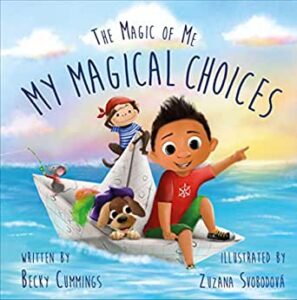
My Magical Choices by Becky Cummings
A beautiful book that shows students that they have the power and choice of how they react and behave. It provides a range of positive things kids could choose to do, such as being honest, generous or tidy.
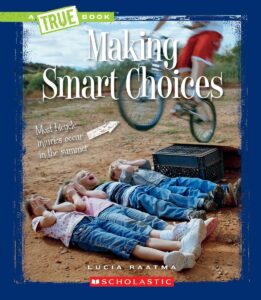
Making Smart Choices by Lucia Raatma
Whether choosing what to eat for lunch or how to react to a stressful situation, it is important that children think carefully. This book teaches students how to make choices that will keep them healthy and happy.
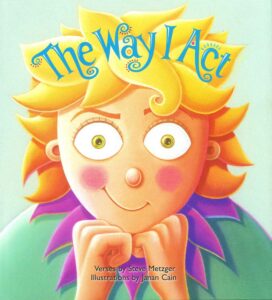
The Way I Act by Steve Metzger
This book shares thirteen different ways of behaving. It conveys many positive ideas of how to act in a variety of situations. Helps teach about self-control and emotional regulation.

What Should Danny Do? By Adir Levy
Danny is a superhero in training and he has the most important superpower of all – the power to choose. He is faced with a variety of situations and the reader helps him decide how he is going to react. It really shows students the impact of the choices that they make. A fun, interactive book!
June is National Internet Safety Month
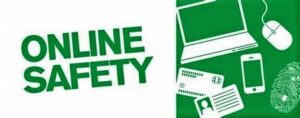
National Internet Safety Month is an annual initiative specifically dedicated to educating people on internet safety. It’s a great time to review our online behavior and identify ways we can use the internet in safer ways. Children/teens are online more than ever; for education, entertainment, and to socialize with friends.
For a full 30 days each June, federal and state governments, industry, and nonprofit organizations unite to promote safe online behavior and practices. The keyword here is “unite.” This month is about recognizing that internet safety is a shared responsibility— knowing we all must join together to make the internet a safer place for everyone at school, work, and at home.
In this day and age, it’s more important than ever to make sure that children/teens stay safe on the Internet. The internet is a great resource for finding information, but it’s important that students are aware of the potential dangers. When they are browsing the Internet, please teach them to follow safety protocols such as:
- Personal Information. Don’t give out personal information without your parents’ permission. This means you should not share your last name, home address, school name, or telephone number. Remember, just because someone asks for information about you does not mean you have to tell them anything about yourself!
- Screen Name. When creating your screen name, do not include personal information like your last name or date of birth.
- Passwords. Don’t share your password with anyone but your parents. When you use a public computer make sure you logout of the accounts you’ve accessed before leaving the terminal.
- Photos. Don’t post photos or videos online without getting your parents’ permission.
- Online Friends. Don’t agree to meet an online friend unless you have your parents’ permission. Unfortunately, sometimes people pretend to be people they aren’t. Remember that not everything you read online is true.
- Online Ads. Don’t buy anything online without talking to your parents first. Some ads may try to trick you by offering free things or telling you that you have won something as a way of collecting your personal information.
- Downloading. Talk to your parents before you open an email attachment or download software. Attachments sometimes contain viruses. Never open an attachment from someone you don’t know.
- Bullying. Don’t send or respond to mean or insulting messages. Tell your parents if you receive one. If something happens online that makes you feel uncomfortable, talk to your parents or to a teacher at school.
- Social Networking. Many social networking websites (e.g., Facebook, Twitter, Second Life and MySpace) and blog hosting websites have minimum age requirements to sign up. These requirements are there to protect you!
- Research. Talk to your librarian, teacher or parent about safe and accurate websites for research. The public library offers lots of resources. If you use online information in a school project make sure you explain where you got the information.
Talking to Students about the SEL Survey Results

Your child recently participated in the Social and Emotional Learning Survey*. SEL is the process through which all young people and adults acquire and apply the knowledge, skills, and attitudes to develop healthy identities, manage emotions and achieve personal and collective goals, feel and show empathy for others, establish and maintain supportive relationships, and make responsible and caring decisions (CASEL, 2021). Students used the survey to share about their SEL skills, relationships, school environment, and mood
It is important to know that social and emotional learning (SEL) occurs both at home and school. Families are our student’s first teachers for social and emotional skills. Families continue to be important partners with schools. Together, they work to build social and emotional skills in the classroom and beyond. To this end, we encourage you to review your child’s SEL survey results with your student.
These results are a report of your student’s experiences at a particular moment in time. This is not a standalone assessment. The SEL screener provides another source of information in addition to what you already know about your student.
You may be in touch with your child’s school to partner on next steps as needed. Schools can help support the growth of SEL skills and wellness for all students this school year. If you have additional questions or concerns, please contact your student’s school counselor.
Talking Points – Supporting Your Student’s Social Emotional Learning
Students have different learning strengths and needs. Consider how they learn best. Share with your student strengths noted in their report. Point out strengths you notice in daily life.
- Ease into a conversation with sentence starters using words, pictures, or symbols.
- Try “I feel __________ because ___________.” or
- “I notice you do (insert a skill) well. What do you think you do well?”
- Offer your student choices to support their learning and decision making.
- “When you were at ______, what made you feel happy/sad/frustrated?”
- “Was it easy or hard for you to say hello to (name a friend) today?
- Use pictures to support your conversation and explain ideas that might be new. Create charts using words or symbols to help reinforce ideas. Visuals might include:
- Feeling words or pictures
- Coping ideas (i.e., music, taking a quiet break, asking for help, etc.)
- Family and school routines or schedules
- Use pictures of family members and friends when talking about relationships.
- Use examples from real life experiences, books, and movies to explain new ideas with your student
*Students did not participate in the SEL survey if their parent/guardian chose to opt out.
LEARN MORE: The Arc Northern Virginia

Transition Lunch & Learn Series – June 15, 2022: 12:00 PM
The Arc promotes and protects the human rights of people with intellectual and developmental disabilities and actively supports their full inclusion and participation in the community throughout their lifetimes. Learn more about The Arc here.
This session will be a Transition Lunch and Learn with an “Expert”. Each Lunch and Learn with an Expert will explore a topic of particular interest to families with young adults in transition age and are planning for the future. All The Arc of Northern Virginia’s webinar events are FREE to attend, but pre-registration is required.
LEARN MORE: NAMI Arlington Parent Support Groups
Register here for Zoom Meeting(s)
These groups are geared to parents whose child is experiencing symptoms of a mental illness, including: depression, anxiety, eating disorders, mood disorders and more. No diagnosis is required to participate. Participants are given the opportunity to share their story, experience support, and glean guidance (as desired) from group members regarding both community and school resources. Confidentiality is respected.
Arlington Groups – Virtual Support Groups – When: 4th Tuesday of each month; 7:30pm – 9:00pm
Contact: Debra Byrd at [email protected] *Please contact Debra Byrd to confirm the meeting time before attending for the first time.
Focus: Parents of Older Teens & Young Adults ages 18-30 – When: 3rd Sunday each month; 1:00pm – 3:00pm
Contact: Naomi Verdugo at (703) 862-9588 for more information on the virtual meetings.*Please contact Naomi to receive the zoom link for this group meeting.
Focus: Parents of Children PK- 12th grade – When: Sundays, 7:00pm – 8:30pm
Contact: Michelle Best [email protected]*Please contact Michelle to receive the zoom link for this group meeting.
LEARN MORE: What can YOU do to prevent child abuse?
Darkness to Light is a Nation-Wide prevention and awareness program that empowers adults to prevent child abuse. The Arlington County Child Advocacy Center is hosting training sessions that are a part of the “Darkness to Light” program and are open to the public. Multiple trainings are available in either English or Spanish.
- Stewards of Children (2 ½ hours)- Learn how to prevent, recognize, and react responsibly to child sexual abuse.
- Healthy Touching (1 hour)- Learn how to balance children’s needs for warmth and affection with safe, respectful ways of interacting.
- Talking with Children about Safety from Sexual Abuse (1 hour)- Learn to have age-appropriate, open conversations about our bodies, sex, and boundaries.
- Bystanders Protecting Children from Boundary Violations and Sexual Abuse (1 hour)- Learn to describe behavior. Set limits. Move on. Always make sure the person who has violated the boundary is willing to follow the limit you set.
- Commercial Sexual Exploitation of Children (I hour)- Learn about commercial sexual exploitation, which is a form of sexual abuse and should not be mistaken for as child’s consent.
Darkness to Light training sessions can also be scheduled and tailored for professional/ community groups on other dates and times.To register for or discuss scheduling any of these Darkness to Light trainings contact Jennifer Gross at 703-228-1561 or [email protected].
LEARN MORE: SCAN of Northern Virginia

Nurturing Parents
For caregivers with children of all ages
Join a community that understands the challenges of raising kids. This series is designed to build skills, celebrate successes, and discuss challenges in a safe environment. Parents leave with a support system and an array of new skills including healthy, effective discipline, stress management, family rules, praise, and more.
Register for SCAN programs here
Resources: CIGNA School Support Line – OPEN TO ALL
Don’t do it alone. There are many reasons to seek help. Some are common, others more serious. Either way, talk with us today if you or a family member are dealing with: Anxiety, Depression, Abuse, Eating disorders, Bullying, Self-harm, Addiction, Peer Pressure, Suicidal thoughts or anything else. No one has to be a Cigna customer to call. If you go to school, or have a child who goes to school, the School Support Line was created for you.
This is a no-cost, confidential service that puts students and families in touch with mental health professionals who know how to listen, ask the right questions, and offer advice. And it’s available around the clock for you and for members of your family. 833-MeCigna (833-632-4462) We’re here 24/7/365!
- School Support Line Spanish
- School Support Line Amharic
- School Support Line Arabic
- School Support Line Mongolian
- School Support Line English
Resources:
Intake/Same Day Access (703-228-1560) Beginning December 20, 2021, Same Day Access/Intakes will be scheduled through 703-228-1560. Visit our website: Children’s Behavioral Healthcare – Official Website of Arlington County Virginia Government (arlingtonva.us) for updated information on how to access mental health and substance use treatment services.
Anyone ages 21 and under experiencing an urgent mental health need is encouraged to contact CR2 (844-627-4747) and anyone experiencing a psychiatric emergency is encouraged to contact Emergency Services (703-228-5160). We will provide an intake assessment to children who are returning to the community from acute psychiatric hospitalization — please call to coordinate.
REACH – Region II (855) 897-8278 If someone you care about, who has an intellectual or developmental disability, is experiencing a crisis due to behavioral or psychiatric needs, the REACH program can help. REACH is the statewide crisis system of care that is designed to meet the crisis support needs of individuals who have a developmental disability and are experiencing crisis events that put them at risk for homelessness, incarceration, hospitalization and/or danger to self or others.
For non-urgent, but concerning behavior, access resources through Arlington Children’s Behavioral Health by clicking here.
Local, Free Food Distributions
| Capital Area Food Bank has several monthly food distribution sites in Arlington available for individuals and families in need. Produce is distributed for free, and no registration is required! The Capital Area Food Bank’s Community Marketplace takes place at Arlington Mill Community Center, 909 S. Dinwiddie St., on the 4th Saturday of every month at 9 a.m. Capital Area Food Bank also distributes at a Mobile Market at 700 S Buchanan St, on the 2nd Thursday of the month from 3 p.m. – 5 p.m. For a full list of local Mobile Market food distributions, view and share this flyer in English and Spanish, or call the information line at (202) 769-5612. |
Student Services Newsletter May 2022
The SEL theme for May is Self-Management and May is National Mental Health Awareness month. We’ve included some great information from Mental Health America and encourage everyone to educate themselves. Lastly, don’t miss the upcoming trainings available to parents, as well as the free and available to all, Cigna Student School Support Line.
SEL Focus: Self-Management
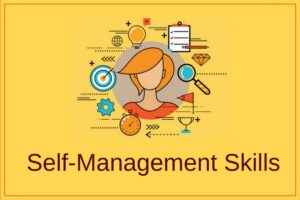
What is Self-Management?
Self-management is an essential component of social emotional learning. Building from the foundation of self-awareness, the Collaborative for Academic, Social, and Emotional Learning (CASEL) defines self-management as, “the ability to successfully regulate one’s emotions, thoughts, and behaviors in different situations.” This regulation is achieved by effectively managing stress, controlling impulses, and motivating oneself. In short, self-management is the ability to set and work toward personal and academic goals without significant deviation.
What Skills are Associated with Self-Management?
To possess self-management, one must develop the following skills and abilities:
- Impulse control – Impulse control relates to the idea of delayed gratification. This refers to the ability to distract oneself from a desire in order to delay that impulse. Impulse control, then, is the ability to not act on immediate impulses, but rather delay that action for a period of time.
- Stress management – Stress management can occur through a variety of strategies. Teachers should expose students to several different methods through discussion and implementation. Having a solid foundation of self-awareness will allow students to determine when they are stressed so that they can implement practiced strategies with more success.
- Self-discipline – Self-discipline requires an individual to control one’s feelings and impulses. Also known as willpower, self-discipline allows us to ignore other stimuli in order to focus on the goal at hand and follow our plans despite distractions.
- Goal setting – Research has found that students tend to find more success when working with individually set goals. These goals, however, need to be SMART (Specific, Measurable, Attainable, Realistic, Timely) so as to better prepare students to successfully meet them.
- Self-motivation – Intrinsic motivation is a skill that is difficult to teach. Students must develop their own internal push that will keep them moving toward a goal. Having developed a specific goal is a great start to employing self-motivation. The chapter “Hill, Skill, and Will” by Seanna Moran and Howard Gardner in Lynn Meltzer’s book Executive Function in Education From Theory to Practice discusses the idea of volition through obstacles, skills necessary to surmount those obstacles, and the will that is required to find success in that process.
- Organizational skills – Organizational skills can refer to the organization of physical space and materials, mental pictures and information, and time. Keeping our work areas uncluttered, as well as storing materials in a neat and organized manner for easy access, allows for more productive work time. Filtering information to be relevant to the topic at hand with a clear big picture can help to keep us on track. Lastly, keeping track of time and being aware of time commitments can help us to meet expectations.
Strategies of Self-Management or Self-Control
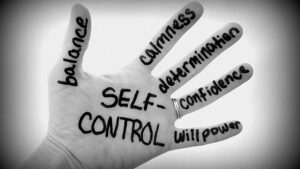
The skill of self-control has been likened to a muscle. Every time we use it, it drains us a little bit. Being demanded to use it constantly will exhaust us completely and is not sustainable. Using self-control in small doses, however, helps us, over time, to build up that “muscle” so it becomes stronger and more “fit” when we need it.
It is important to select developmentally appropriate tasks when helping children foster self-control competencies. Even though self-control improves over time, there can be quite some differences in children of the same age. When helping children develop self-control skills, try setting up simple goals first, where success is expected, before moving onto the next goal. For preschoolers, goals might include not interrupting or not fighting on the playground. For an early elementary school student, appropriate goals might be complying with bedtime rules or showing frustration appropriately. Some general strategies that often help children learn appropriate self-control behaviors include:
- Take a break: encourage children to take a break or ‘time in’ (such as turtle time) whenever they feel overwhelmed, angry, or frustrated. Stepping away from an upsetting situation can help a child calm down.
- Teach and provide attention: Paying attention is a skill that can be taught. Encourage children to resist interrupting by learning how to observe others when not talking, so they can join in appropriately. Make sure to provide children with appropriate attention at times so they don’t feel ignored and therefore are more likely to interrupt.
- Use appropriate rewards: to foster positive behavior children need consistent positive feedback. Praise and consistent feedback can be highly rewarding for young children, as is special time with a parent. It is important to let a child know what is a desired behavior.
- Use activities designed to teach self-regulation: using specific activities can help parents and teachers teach (young) children skills that foster self-control. Some of these skills include dealing with “wanting something I can’t have”, understanding feelings, and controlling anger.
Recommended Books to help teach young children about Self-Management

In these picture books, you will find characters who illustrate the benefits of self-management by showing:
- Improved confidence and self-esteem
- Increased motivation and enthusiasm
- Increased ability to set and achieve goals
- Improved study skills and academic performance
- Having pride and confidence in achievements
- Understanding that meeting goals and challenges is not always easy

Again! By Emily Gravett
A dragon wants his bedtime story again and again. When his mother falls asleep during the fourth reading the dragon cannot control his emotions and burns a hole through the back of the book! Promotes manners, self-management and emotions.
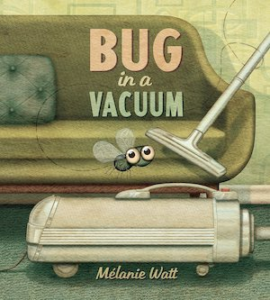
Bug in a Vacuum by Melanie Watt
A bug is sucked into a vacuum bag as it flies around a house. It goes through the five stages of grief as it tries to come to terms with its situation. This book will help children understand the different emotions involved in unexpected, disappointing, and sad events.

Eat Pete! By Michael Rex
A monster visits Pete with plans to eat him. But Pete is thrilled to have someone to play with and keeps the monster busy. Will he ever get to eat Pete? A humorous picture book about friendship and self-management.
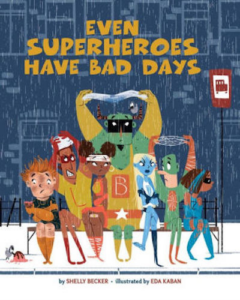
Even Superheroes Have Bad Days by Shelly Becker
Help children cope when they are feeling overwhelmed by reading about how Superheroes manage their emotions when they are having a bad day.

Fergal is Fuming! By Robert Starling
Fergal the dragon can’t keep friends, because of his short temper, particularly when he doesn’t get his own way. He notices others have effective strategies to calm down and he finds his own way to cool down. This book reinforces self-management, a growth mindset, and balance.
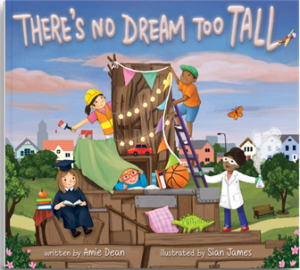
There’s No Dream Too Tall
Shows kids that their different strengths can help them become who they want to be.

A Grown-up’s guide to kids wiring
Kathleen Edelman focuses on the 4 temperaments and how to communicate with each one. There are free videos that go along with this, and if you love to know the “why” of certain decisions and behaviors, you will love this one.
May is Mental Health Awareness Month
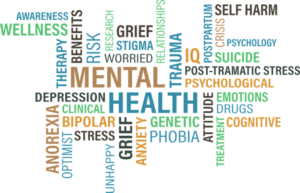
With mental health entering more and more of our daily conversations, it’s critical that everyone has a solid foundation of knowledge about mental health. That’s why for Mental Health Month this year, Mental Health America is going Back to Basics.
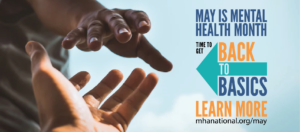
Since the start of the pandemic, more and more people are talking about mental health. An increasing number of folks are starting to see it for what it is: one important component of your overall health and well-being, just like your physical health. But mental health conditions, resources, and conversations can still feel complicated and out of reach.
Are there common warning signs for mental health conditions or crises? Specific factors that can lead to mental health conditions or even crises? What resources are out there – and how do I know if they’re right for me?
Many people are learning about mental health topics for the first time. Having a widespread understanding of the topic can help you be more informed if you or someone you know is experiencing a mental health condition or crisis. Around half of people in the U.S. will meet the criteria for a diagnosable mental health condition at some point in their life, so everyone should know what to look out for.
Everyone should have the support needed to thrive. Communities that have been historically and presently oppressed face a deeper mental health burden because of the added impact of trauma, oppression, and harm.
There’s often no one single cause for a mental health condition. Instead, there are many possible risk factors that can influence how likely a person is to experience a mental health condition or how serious the symptoms may be.
Some risk factors for mental health conditions include: trauma, which can be a one-time event or ongoing; your environment and how it impacts your health and quality of life (also known as social determinants of health like financial stability and health care access); genetics; brain chemistry; and your habits and lifestyle such as a lack of sleep.
Of course, understanding the risk factors for a mental health condition can be more difficult when it’s your own mental health. Take time to ask yourself about your thoughts, feelings, and behaviors to see if this is part of a pattern that may be caused by a mental health condition.
Here are some questions to get you started:
• Have things that used to feel easy started feeling difficult?
• Does the idea of doing daily tasks like making your bed now feel really, really hard?
• Have you lost interest in activities and hobbies you used to enjoy?
• Do you feel irritated, possibly to the point of lashing out at people you care about?
Our society focuses much more on physical health than mental health, but both are equally important. If you are concerned about your mental health, there are several options available. You are not alone – help is out there, and recovery is possible. It may be hard to talk about your concerns, but simply acknowledging to yourself that you’re struggling is a really big step.
Taking a screen at mhascreening.org can help you to better understand what you are experiencing and get helpful resources. After that, consider talking to someone you trust about your results, and seek out a professional to find the support you need.
While you may not need this information today, knowing the basics about mental health will mean you’re prepared if you ever need it. Go to mhanational.org/may to learn more.
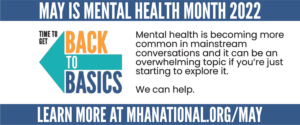
Here are two articles that include APS student services staff voice on the state of mental health in our community.
“Helping with Stress Management for Teens”https://psychcentral.com/stress/teen-stress?utm_source=ReadNext
“The Kids are Not Alright”https://www.arlingtonmagazine.com/teens-pandemic-mental-health/
APS Highlight
HB Woodlawn’s Mental Health Fair
HB Woodlawn hosted a Mental Health Fair on Thursday April 28th. The Student Services Team welcomed 14 different organization for the students to speak with regarding mental health such as Hands2Heart, Doorways, SAFE Project, The AAKOMA Project, and the American Foundation for Suicide Prevention, to name a few. It was a great success!
May is National Prevention Awareness Month

National Prevention Week (NPW) is a national public education platform bringing together communities and organizations to raise awareness about the importance of substance use prevention and positive mental health
Drug and Alcohol Prevention and Education Resources:
Press release: https://www.alexandriava.gov/news-dchs/2022-05-04/city-of-alexandria-officials-warn-of-dangers-posed-by-recent-spike-in-opioid
APS AARI website: https://www.arlingtonva.us/Government/Programs/Health/Arlington-Addiction-Recovery-Initiative.
APS Substance Abuse Counselors https://aps2016.apsva.us/student-services/substance-abuse-counselors/contact-us-2/
Fentanyl video: https://www.youtube.com/watch?v=rA6qsLS9qC4
LEARN MORE: What can YOU do to prevent child abuse?
Darkness to Light is a Nation-Wide prevention and awareness program that empowers adults to prevent child abuse. The Arlington County Child Advocacy Center is hosting training sessions that are a part of the “Darkness to Light” program and are open to the public. Multiple trainings are available in either English or Spanish.
- Stewards of Children (2 ½ hours)- Learn how to prevent, recognize, and react responsibly to child sexual abuse.
- Healthy Touching (1 hour)- Learn how to balance children’s needs for warmth and affection with safe, respectful ways of interacting.
- Talking with Children about Safety from Sexual Abuse (1 hour)- Learn to have age-appropriate, open conversations about our bodies, sex, and boundaries.
- Bystanders Protecting Children from Boundary Violations and Sexual Abuse (1 hour)- Learn to describe behavior. Set limits. Move on. Always make sure the person who has violated the boundary is willing to follow the limit you set.
- Commercial Sexual Exploitation of Children (I hour)- Learn about commercial sexual exploitation, which is a form of sexual abuse and should not be mistaken for as child’s consent.
Darkness to Light training sessions can also be scheduled and tailored for professional/ community groups on other dates and times.To register for or discuss scheduling any of these Darkness to Light trainings contact Jennifer Gross at 703-228-1561 or [email protected].
LEARN MORE: National Alliance on Mental Illness Arlington Parent Support Groups
The National Alliance on Mental Illness, NAMI, provides group support geared to parents whose child is experiencing symptoms of a mental illness, including depression, anxiety, eating disorders, mood disorders and more. No diagnosis is required to participate. Participants are given the opportunity to share their story, experience support, and glean guidance (as desired) from group members regarding both community and school resources. Confidentiality is respected.
School Age Students and Teens (PK-12): For Questions Contact Michelle Best ([email protected])
Sundays 7pm-8:30pm Register here for Zoom Meeting(s)
- May 9th and 22nd
- June 5th and 19th
Older Teen and Young Adults: 3rd Sunday 1-3pm
For questions contact: Adults: Naomi Verdugo ([email protected]) or Alisa Cowen ([email protected])

Nurturing Parents
For caregivers with children of all ages
Join a community that understands the challenges of raising kids. This series is designed to build skills, celebrate successes, and discuss challenges in a safe environment. Parents leave with a support system and an array of new skills including healthy, effective discipline, stress management, family rules, praise, and more.
Register for SCAN programs here
Resources: CIGNA School Support Line – OPEN TO ALL
Don’t do it alone. There are many reasons to seek help. Some are common, others more serious. Either way, talk with us today if you or a family member are dealing with: Anxiety, Depression, Abuse, Eating disorders, Bullying, Self-harm, Addiction, Peer Pressure, Suicidal thoughts or anything else. No one has to be a Cigna customer to call. If you go to school, or have a child who goes to school, the School Support Line was created for you.
This is a no-cost, confidential service that puts students and families in touch with mental health professionals who know how to listen, ask the right questions, and offer advice. And it’s available around the clock for you and for members of your family. 833-MeCigna (833-632-4462) We’re here 24/7/365!
- School Support Line Spanish
- School Support Line Amharic
- School Support Line Arabic
- School Support Line Mongolian
- School Support Line English
Resources:
Intake/Same Day Access (703-228-1560) Beginning December 20, 2021, Same Day Access/Intakes will be scheduled through 703-228-1560. Visit our website: Children’s Behavioral Healthcare – Official Website of Arlington County Virginia Government (arlingtonva.us) for updated information on how to access mental health and substance use treatment services.
Anyone ages 21 and under experiencing an urgent mental health need is encouraged to contact CR2 (844-627-4747) and anyone experiencing a psychiatric emergency is encouraged to contact Emergency Services (703-228-5160). We will provide an intake assessment to children who are returning to the community from acute psychiatric hospitalization — please call to coordinate.
REACH – Region II (855) 897-8278 If someone you care about, who has an intellectual or developmental disability, is experiencing a crisis due to behavioral or psychiatric needs, the REACH program can help. REACH is the statewide crisis system of care that is designed to meet the crisis support needs of individuals who have a developmental disability and are experiencing crisis events that put them at risk for homelessness, incarceration, hospitalization and/or danger to self or others.
For non-urgent, but concerning behavior, access resources through Arlington Children’s Behavioral Health by clicking here.
Local, Free Food Distributions
| Capital Area Food Bank has several monthly food distribution sites in Arlington available for individuals and families in need. Produce is distributed for free, and no registration is required! The Capital Area Food Bank’s Community Marketplace takes place at Arlington Mill Community Center, 909 S. Dinwiddie St., on the 4th Saturday of every month at 9 a.m. Capital Area Food Bank also distributes at a Mobile Market at 700 S Buchanan St, on the 2nd Thursday of the month from 3 p.m. – 5 p.m. For a full list of local Mobile Market food distributions, view and share this flyer in English and Spanish, or call the information line at (202) 769-5612. |
Student Services Newsletter April 2022
The SEL theme for April is Social Awareness. This month’s newsletter also highlights that April is National Stress Awareness month and National Alcohol Awareness month. As a reminder, we are also currently administering the APS SEL Survey. Lastly, don’t miss the upcoming trainings available to parents, as well as the free and available to all, Cigna Student School Support Line.
SEL Focus: Social Awareness
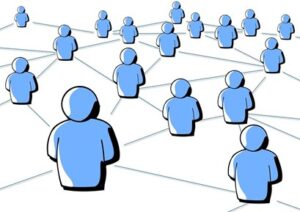
Social Awareness is the ability to take the perspective of and empathize with others from diverse backgrounds and cultures; to understand social and ethical norms for behavior; and to recognize family, school, and community resources and supports. Social awareness is a crucial component of appropriate classroom behavior, which contributes to an environment conducive to learning. Social awareness is also widely established as an important factor in workforce success. One recent employer survey conducted by the Partnership for 21st Century Skills demonstrates that four of the five most important skills for high school graduates entering the workforce are linked to social awareness: professionalism, collaboration, communication, and social responsibility.
Why This Matters:
Social awareness may contribute to better behavior and achievement in school and increased engagement with community and school resources:
- Positive Classroom Climate: Students with strong social awareness can more easily adapt to their environment, empathize with the perspectives of others, and engage in fewer disruptive classroom behaviors. This, in turn, creates an environment where students can focus on learning.
- Better Relationships: Students who demonstrate strong social awareness are able to engage in constructive communication with their peers and resolve conflicts when they arise. These students benefit from peer learning and know how to take advantage of social supports.
- Fewer Risky Behaviors: Students who are able to adapt to new environments, understand the needs and perspectives of others, and know where to get support when they need it are less prone to emotional distress and less likely to engage in risk behaviors, such as drug use and aggression, that interfere with school success.
Here are some tactics that can help you become more socially aware:
- Understand what it means to listen.

- Repeat what was said.
- Pay attention to tone of voice.
- Watch facial expressions and body language.
- Notice the details.
Learn more by watching this video: CLICK HERE Discover ways to help children develop social awareness and learn empathy by putting themselves in another’s shoes: recognizing emotions, appreciating diversity and showing respect for others.
Recommended Books to help teach young children about Social Awareness
Each book is available through Arlington Public School Libraries. Click on book title link for more information.
From moments of great joy and exuberance to [necessary] times of quiet contemplation, your heart is your guide
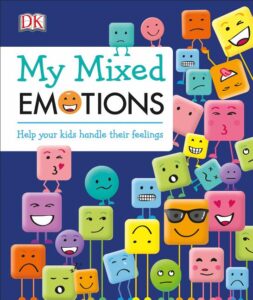
My Mixed Emotions: Help Your Kids Handle Their Feelings by DK
My Mixed Emotions explores the four main emotions, the reasons why we feel them, and the science behind each one.
Rescue & Jessica: A Life-Changing Friendship by Jessica Kensky, Patrick Downes, and Scott Magoon
When he is paired with a girl who has lost her legs, Rescue worries that he isn’t up to the task of being her service dog.

Under My Hijab by Hena Khan and Aaliya Jaleel
As a young girl observes that each of six women in her life wears her hijab and hair in a different way, she considers how to express her own style one day.

When the Cousins Came by Katie Yamasaki
Even though Lila’s cousins do some things differently, Lila loves when they come to visit.
April is Stress Awareness Month

Stress Awareness Month increases public awareness about the causes of stress and how to help combat it in this harried, modern-day life. Stress can filter in from various parts of life, from the workplace as well as personal relationships, and coping with and relieving it can certainly look different for each individual person. Learning about this month can certainly help anyone who struggles to cope with their stress and those may find themselves in need of guidance and advice. So get ready to get aware and involved with Stress Awareness Month!
History of Stress Awareness Month
There have been many investigations and studies into the cause of stress and how humans tend to react to it in different ways. Back in 1936, Hans Selye began his pioneering studies into stress and developed the concept of general adaptation syndrome. But it wasn’t until the 1950s that personality types were defined, which led to many other breakthroughs in the psycho-social sciences and a better understanding of the potentially devastating effects of stress on individuals as well as society.
Stress is a widespread feeling that almost everyone will experience at one time or another in their lives. As such, millions of individuals around the world are likely to struggle with it and have their lives impacted negatively by it.
Stress can have an impact on a person’s health, whether physically, mentally or emotionally–and often it is a combination of them all! These health issues, when allowed to build up over time, could manifest themselves in issues such as anxiety and depression, hormonal problems, difficulty sleeping, high blood pressure, heart disease and much more.
The most important thing with this month is that people are focusing on their physical, mental and emotional health and wellbeing. For some, this might mean putting themselves first for a change and focusing on bringing those stress levels down in whatever ways are possible.
Participate in the 30 Day Stress Awareness Challenge

One way of doing something for stress awareness month is to participate in the 30-day Stress Awareness challenge. This 30-day challenge encourages people to do one action each day that will benefit their physical, mental, and emotional wellbeing. This can be really helpful in changing a person’s mindset and outlook on stress, as well as finding ways to help cope with certain stresses that may become more obvious and pervasive over time. This is a great way for people to learn a lot about themselves and the particular triggers that tend to come with stress.
Practice Stress Reduction Techniques
Try out some of these simple practices that have been known to help people reduce the negative impact of stress on their lives:
- Breathing Exercises. One of the easiest ways to bust stress is by pausing to focus on the breath. Whether breathing slowly while counting, or using visualization techniques, the internet is full of ideas for reducing stress by taking everything back to the breath.
- Laugh More. Some studies have shown that people are more relaxed and have an improved mood when they practice laughing. Even when nothing is funny! Laughter yoga might be a practice worth checking out to reduce stress.
- Exercise. One of the best ways to minimize the impact of stress on the body and mind is through good, old-fashioned exercise. Sweat that stress away! It helps to improve sleep, balance hormones, increase endorphins and fosters relaxation following the workout.
- Reduce Stress Triggers. Take this month to become aware of what triggers tend to cause stress and anxiety. Is it to do with being late? Procrastinating? Terrible traffic? A messy house? Look at the ways that stress begins and then aim to resolve those with life skills such as time management, hiring help around the house, leaving the house sooner or other solutions.
National Alcohol Awareness Month
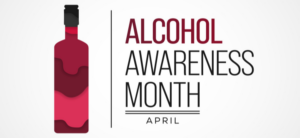
Every April the National Council for Alcoholism and Drug Dependence (NCADD) sponsors Alcohol Awareness Month to increase awareness and understanding of the causes and treatment of the nation’s #1 public health problem: alcoholism. The theme this year is “Changing Attitudes: It’s not a ‘rite of passage.’” The target audience: youth and their parents.
This campaign and associated events are an opportunity to reduce the stigma associated with alcohol dependence, as well as remove the barriers to treatment and recovery while making help available to those who suffer from the disease.
TRY TO GO DRY
An important part of Alcohol Awareness Month is choosing an Alcohol-Free weekend during the month of April. The intent is for you to stop drinking from Friday through Monday, and then gauge the effect of the alcohol-free days.
If your body has become used to the continual presence of alcohol, suddenly stopping can cause physical effects, such as sweating, nausea, headaches and trouble sleeping.
If it was difficult to manage 72 hours without drinking, that struggle could signal a dependence on alcohol that should be more closely examined. If you are having trouble with your three-day alcohol-free test, we urge you to learn more about alcoholism and its early symptoms and seek professional assistance if needed. (SOURCE: National Council on Alcoholism and Drug Dependence)If you have determined that your drinking is posing a problem in your life but has not yet led to severe consequences, you might consider actively cutting down and following these strategies:
- Change Environment/social circles: If you drink with the same group of friends who partake in drinking, it might be time to take a step back. When we are around others drinking, it feels natural to participate and want to fit in. If they are your true friends, they will support you for pursuing a healthier lifestyle. If they do not, try to do your best to keep moving forward. Try joining a gym or athletic club instead, or volunteer for a cause you believe in to fill up your time.
- Support Groups: Do research in your hometown to find other like-minded individuals who actively don’t drink. This could be an AA/NA or SMART Recovery group, or other organization for people who want to stop using substances completely, or it could be less defined. It could even be members of your family you make plans with more, or friends you can hang out with that aren’t looking to drink.
- Sharing your plan: Make sure to stay accountable to yourself by letting people in your life know what’s going on. Explain that you are cutting down or stopping, and ask if they could help you along the way.
March 21st-April 8th: APS Social-Emotional Learning Survey
We invite you to visit our webpage to view survey questions, FAQ’s about and learn more about the development of the APS SEL Survey from Panorama
WHAT IS SOCIAL-EMOTIONAL LEARNING?
Social-emotional learning (SEL) describes the mindsets, skills, attitudes, and feelings that help students succeed in school, career, and life. At its core, SEL focuses on students’ fundamental needs for motivation, social connectedness, and self-regulation as prerequisites for learning. Educators may also refer to SEL as “non-cognitive skills,” “soft skills,” “21st century skills,” “character strengths,” and “whole child development.”
Social-emotional learning is an important part of a well-rounded education. A 2017 meta-analysis from CASEL (the Collaborative for Academic, Social, and Emotional Learning) shows that investment in SEL has led to improved classroom behavior, better stress management, and 13 percent gains in academics.
A 2019 report from the Aspen Institute, “From a Nation at Risk to a Nation at Hope,” compiles evidence confirming that supporting students’ social, emotional, and cognitive development relates positively to traditional measures like attendance, grades, test scores, graduation rates, college and career readiness, and overall well-being. Research also shows that promoting student SEL starts with adults. In order to cultivate student SEL, caring adults in school buildings need to feel supported and validated. Adult social-emotional learning is the process of helping educators build their expertise and capacity to lead, teach, and model SEL. It involves cultivating adults’ own social and emotional competencies, wellbeing, and cultural competency, as well as a positive school climate that promotes SEL.
HOW CAN SCHOOLS MEASURE SOCIAL-EMOTIONAL LEARNING?
By asking students to reflect on SEL through surveys, APS can gather actionable data to prioritize supports. Panorama’s SEL Survey helps educators measure and improve SEL in the following areas:
- Skills and Competencies: The social, emotional, and motivational skills that help students excel in school, career, and life. Example topics: Growth Mindset, SelfEfficacy, Social Awareness
- Supports and Environment: The environment in which students learn, which influences their academic success and social-emotional development. Example topics: Sense of Belonging
- Well-Being: Students’ positive and challenging feelings, as well as how supported they feel through relationships with others. Example topics: Positive Feelings.
LEARN MORE: National Alliance on Mental Illness Arlington Parent Support Groups
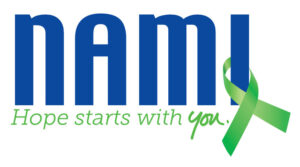
The National Alliance on Mental Illness, NAMI, provides group support geared to parents whose child is experiencing symptoms of a mental illness, including depression, anxiety, eating disorders, mood disorders and more. No diagnosis is required to participate. Participants are given the opportunity to share their story, experience support, and glean guidance (as desired) from group members regarding both community and school resources. Confidentiality is respected.
School Age Students and Teens (PK-12): For Questions Contact Michelle Best ([email protected])Sundays 7pm-8:30pm Register here for Zoom Meeting(s)
- April 10th and 24th
- May 9th and 22nd
- June 5th and 19th
Older Teen and Young Adults: 3rd Sunday 1-3pmFor questions contact: Adults: Naomi Verdugo ([email protected]) or Alisa Cowen ([email protected])
View Arlington NAMI Support Groups 2022 Flyer
LEARN MORE: Youth Mental Health First Aid Training Available to Staff & Parents
The Office of Student Services continues to be committed to training all new staff and re-certifying staff in Youth Mental Health First Aid (YMHFA). This is a 6-hour course that teaches how to identify, understand, and respond to signs of mental illnesses and substance use disorders. Registration for staff is through Frontline. Parents can register by calling the Office of Student Services at 703-228-6062. Training will be provided every month for the remainder of the year.
Upcoming session dates are: April 27, and May 10.
LEARN MORE: SCAN OF NORTHERN VIRGINIA
Nurturing Parents
For caregivers with children of all ages
Join a community that understands the challenges of raising kids. This series is designed to build skills, celebrate successes, and discuss challenges in a safe environment.
Parents leave with a support system and an array of new skills including healthy, effective discipline, stress management, family rules, praise, and more.
English: Tuesday’s 4/19—6/14 Spanish: Wednesday’s 4/27—6/15
Register for SCAN programs here
RESOURCES: CIGNA School Support Line – OPEN TO ALL
Don’t do it alone. There are many reasons to seek help. Some are common, others more serious. Either way, talk with us today if you or a family member are dealing with: Anxiety, Depression, Abuse, Eating disorders, Bullying, Self-harm, Addiction, Peer Pressure, Suicidal thoughts or anything else. No one has to be a Cigna customer to call. If you go to school, or have a child who goes to school, the School Support Line was created for you.This is a no-cost, confidential service that puts students and families in touch with mental health professionals who know how to listen, ask the right questions, and offer advice. And it’s available around the clock for you and for members of your family. 833-MeCigna (833-632-4462) We’re here 24/7/365!
- School Support Line Spanish
- School Support Line Amharic
- School Support Line Arabic
- School Support Line Mongolian
- School Support Line English
RESOURCES: CrisisLink Hotline & Textline
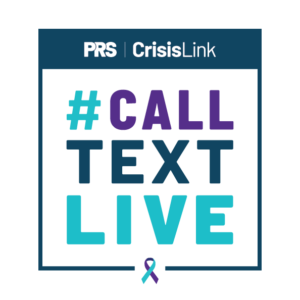
- Services available: Crisis intervention, suicide prevention, support, and information about community resources
- Who qualifies: Anyone experiencing emotional trauma, a personal crisis, or a family crisis.
- How to access: Call 703-527-4077 or 1-800-273-TALK (8255); or text CONNECT to 855-11
- Availability: Operated by PRS and staffed by highly trained paraprofessional volunteers and crisis line workers 24/7
- Website: https://prsinc.org/crisislink/
RESOURCES: Community Regional Crisis Response (“CR2”)
- Services available: Mobile crisis response, including screenings, assessments, psychiatric services, case management, post-discharge follow-up, care coordination, and safety planning
- Who qualifies: Anyone experiencing a mental health and/or substance use emergency that puts them at risk of hospitalization
- How to access: Call 844-627-4747 or 571-364-7390 to access phone, video conferencing, or in-person services
- Availability: Operated by the National Counseling Group, and staffed by counselors 24/7
- Website: https://www.cr2crisis.com/
RESOURCES:
Intake/Same Day Access (703-228-1560) Beginning December 20, 2021, Same Day Access/Intakes will be scheduled through 703-228-1560. Visit our website: Children’s Behavioral Healthcare – Official Website of Arlington County Virginia Government (arlingtonva.us) for updated information on how to access mental health and substance use treatment services.
REACH – Region II (855) 897-8278 If someone you care about, who has an intellectual or developmental disability, is experiencing a crisis due to behavioral or psychiatric needs, the REACH program can help. REACH is the statewide crisis system of care that is designed to meet the crisis support needs of individuals who have a developmental disability and are experiencing crisis events that put them at risk for homelessness, incarceration, hospitalization and/or danger to self or others.
For non-urgent, but concerning behavior, access resources through Arlington Children’s Behavioral Health by clicking here.
Local, Free Food Distributions
| Capital Area Food Bank has several monthly food distribution sites in Arlington available for individuals and families in need. Produce is distributed for free, and no registration is required! The Capital Area Food Bank’s Community Marketplace takes place at Arlington Mill Community Center, 909 S. Dinwiddie St., on the 4th Saturday of every month at 9 a.m. Capital Area Food Bank also distributes at a Mobile Market at 700 S Buchanan St, on the 2nd Thursday of the month from 3 p.m. – 5 p.m. For a full list of local Mobile Market food distributions, view and share this flyer in English and Spanish, or call the information line at (202) 769-5612. |
Student Services Newsletter March 2022
The SEL theme for March is Self-Awareness. Check out some recommended books for young children to strengthen self-awareness, all of which are available to check out through Arlington Public Library. This month’s newsletter also highlights National Professional Social Work Week, March 6-12, National Drug & Alcohol Facts Week, March 21-27, and the upcoming APS SEL Survey. Lastly, don’t miss the upcoming trainings available to parents, as well as the free and available to all, Cigna Student School Support Line.
SEL Focus: Self-Awareness
Self-awareness is the ability to consider and understand your own emotions, thoughts, values, and experiences, and how these can influence your actions. Improving your self-awareness can allow you to more effectively identify your individual strengths and weaknesses in a range of areas, and therefore potentially improve your decision making and self-management (two other core SEL competencies).
Recognizing how your thoughts and feelings impact your behavior can encourage you to make positive changes in your life and take the perspective that will provide new insight into your own decisions, interests and actions. Within the five core SEL competencies, self-awareness is essential as it not only fosters optimism and responsible decision making, but it also provides a foundation to establish and maintain healthy relationships with others.
Self-awareness is a skill that continually develops as we learn more about ourselves, our abilities, and our values. Strengthening self-awareness early in life can help students succeed socially, emotionally, and academically.
Why Is Self-Awareness Important for Students?
Studies show that students with a strong understanding of emotions perform better academically and report higher levels of well-being. Self-aware students also have more positive relationships with teachers and classmates and engage in less risky behaviors. Strong self-awareness skills continue to benefit students into adulthood. Knowing how to set, plan, and achieve short and long-term goals is critical for college and career success. In fact, business leaders frequently identify self-awareness as one of the top leadership skills.
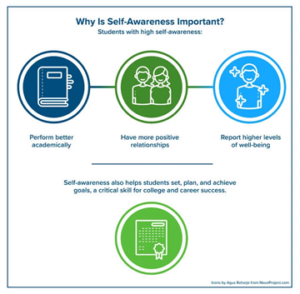
Benefits of self-awareness:
- It gives us the power to influence outcomes.
- It helps us to become better decision-makers.
- It gives us more self-confidence — so, as a result, we communicate with clarity and intention.
- It allows us to understand things from multiple perspectives.
- It frees us from our assumptions and biases.
Developing self-awareness

Unplug – Dedicating time away from screens and creating the opportunity to be on our own for a while reduces tension. Learning to be comfortable in our company is necessary to learn about ourselves and to ground ourselves.

Practice Mindfulness – This exercise involves noticing what is happening now—being fully present with all our senses, noticing sounds, smells, images, thoughts and feelings. It means being open to the experience without resistance or avoidance (Gilbert & Choden, 2013).

Take time to reflect – Research shows that writing down our thoughts in a notebook is an effective technique to process thoughts and feelings. Dedicating time to focusing our attention to understand the whole situation without self-judgment. It helps to clarify ideas and to understand feelings (Pennebaker, 2018).

Practice Listening – We usually think we are good listeners; however, often, we can be more focused on our list of things to do that we miss information. Or, we make assumptions about what others are saying and miss important details. When in conversation, we can pay attention to the other person and to what they are saying. Listening carefully improves communication and feeling understood.

Practice self-compassion – It involves treating ourselves in the way we would treat our best friend when going through a difficult time. Dealing with difficult thoughts and feelings with kindness and understanding. It means that, like all human beings, we can make mistakes. As we develop our self-awareness, we will learn how to manage our reactions and apply strategies to deal with challenges in constructive ways. It also enables us to maintain our social network – a key element in keeping well and having a sense of belonging (Neff, 2011).
Recommended Books to help teach young children about Self Awareness
Each book is available through Arlington Public School Libraries. Click on book title link for more information.

After the Fall: How Humpty Dumpty Got Back Up Again by Dan Santat
After falling off the wall, Humpty Dumpty is very afraid of climbing up again, but is determined not to let fear stop him from being close to the birds.
The Bad Seed by Jory John and Pete Oswald
A sunflower seed who barely escaped being eaten personifies the word bad–he has bad manners, he wears a constant scowl on his face, and he lies about even the littlest things. But when the seed decides he’d like to change, he reveals that one’s attitude is a choice.
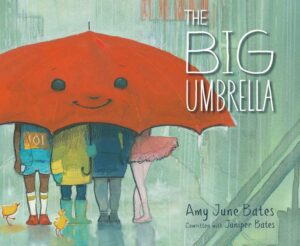
The Big Umbrella by Amy June Bates and Juniper Bates
A spacious umbrella welcomes anyone and everyone who needs shelter from the rain.

Emmanuel’s Dream: The True Story of Emmanuel Ofosu Yeboah by Laurie Ann Thompson and Sean Qualls
In 2001, with one strong leg, Emmanuel Ofosu Yeboah bicycled 400 miles around Ghana to spread the message that “being disabled does not mean being unable.”
How to Be a Lion by Ed Vere
In this picture book, Leonard the lion and his best friend Marianne the duck spend all their time together laughing and playing games. One day, a pack of lion bullies approach Leonard and say hurtful things about how lions shouldn’t be friends with ducks. Leonard is forced to confront the bullies and shows how kindness can overcome negativity.
Julián is a Mermaid by Jessica Love
While riding the subway home from the pool with his abuela one day, Julián notices three women spectacularly dressed up. Their hair billows in brilliant hues, their dresses end in fishtails, and their joy fills the train car. When Juliań gets home, daydreaming of the magic he’s seen, all he can think about is dressing up just like the ladies in his own fabulous mermaid costume: a butter-yellow curtain for his tail, the fronds of a potted fern for his headdress. But what will Abuela think about the mess he makes–and even more importantly, what will she think about how Julián sees himself?
March is Social Work Month
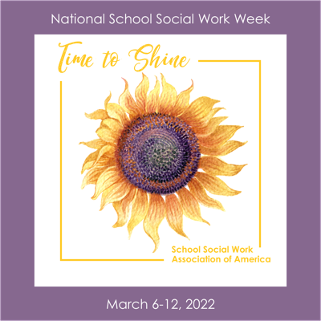 Celebrated each March, National Professional Social Work Month is an opportunity for social workers across the country to turn the spotlight on the profession and highlight the important contributions they make to society.
Celebrated each March, National Professional Social Work Month is an opportunity for social workers across the country to turn the spotlight on the profession and highlight the important contributions they make to society.
The theme for Social Work Month 2022 is The Time to Shine.
The School Social Work Association of America (SSWAA) believes that School Social Workers shine brightly for their students, families, and school communities.
Shining hope. Shining understanding. Shining respect.
The Role of School Social Workers
School Social Workers provide a focused reach to support all students specifically in areas of social-emotional learning and mental health needs, and are uniquely trained to integrate the school, community, and family context into interventions and resource referrals. School social work interventions reduce barriers to learning enabling students to be physically, mentally, and emotionally present and ready to learn in the classrooms.
School social workers are educated to work towards equity and root their practices in social justice…this means school social workers are educated to break down opportunity gaps and address systemic inequities, which can be exacerbated by current social and environmental conditions.
School social workers address barriers to learning honoring an individual’s dignity and worth… this means through relational work school social workers are trained to meet mental health, social, emotional, behavioral, and physical needs to contribute to academic achievement.
School social workers utilize trauma sensitive healing centered approaches and have specific training about cultural awareness… this means school social workers are trained to support and apply culturally responsive school practices.
As you can see, our diverse and talented social workers are essential to removing barriers for students and strengthening family-school partnerships. View this video featuring APS school social workers and please take time to thank our social workers during School Social Worker week, March 6-12, and year-round!.

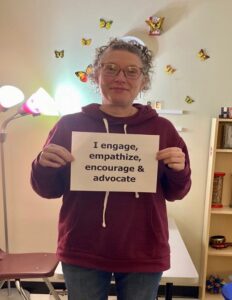
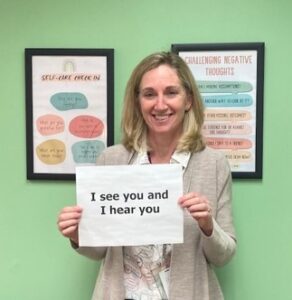
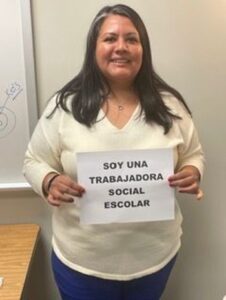
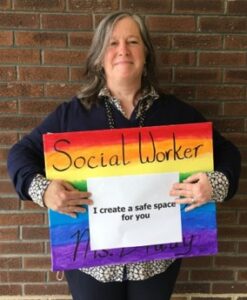
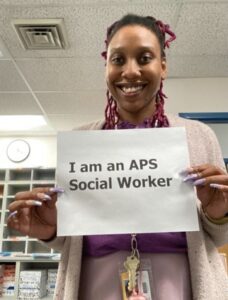
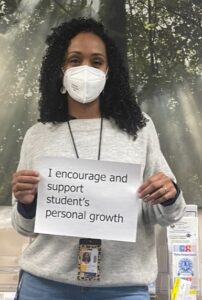
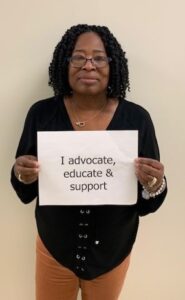
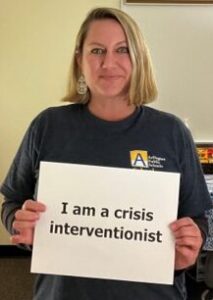
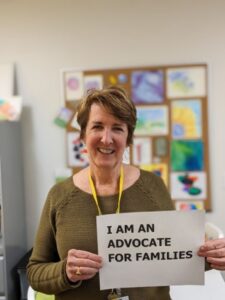
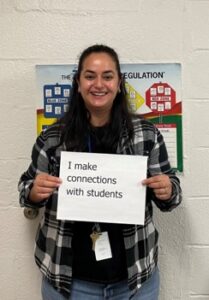
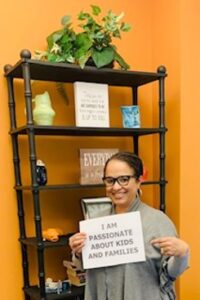
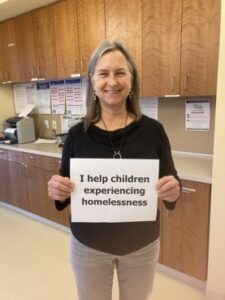
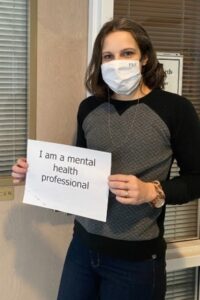
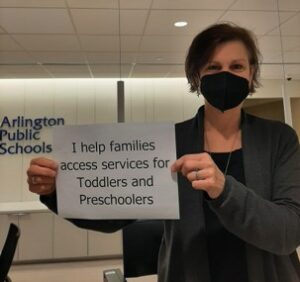
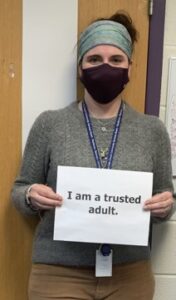
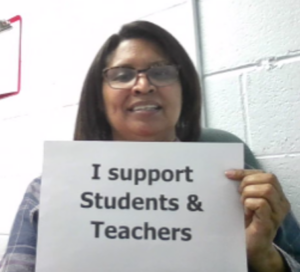
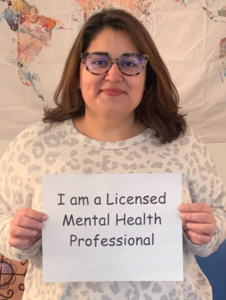
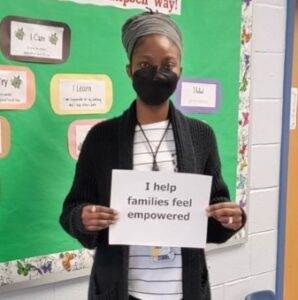
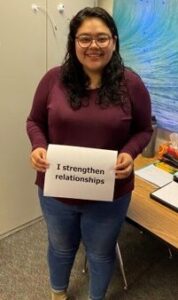
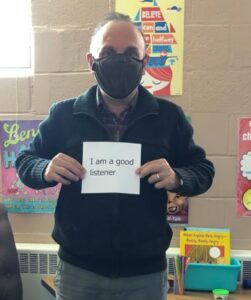
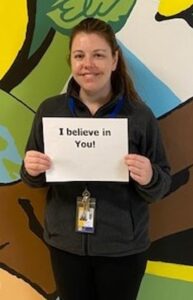
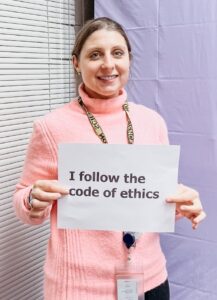
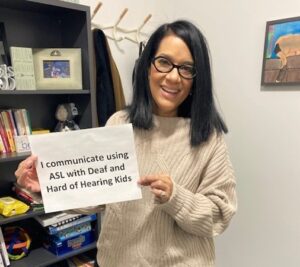
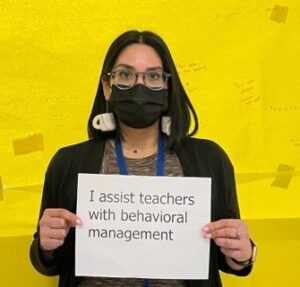
National Drug & Alcohol Facts Week March 21-27, 2022
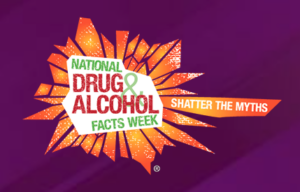
National Drug and Alcohol Facts Week, or NDAFW, is an annual, week-long, health observance that inspires dialogue about the science of drug use and addiction among youth. It provides an opportunity to bring together scientists, students, educators, healthcare providers, and community partners—to help advance the science, so that we can improve the prevention and awareness of substance misuse in our own communities and nationwide. It was launched in 2010 by scientists at the National Institute on Drug Abuse (NIDA) to stimulate educational events in communities so teens can learn what science has taught us about drug use and addiction. The National Institute on Alcohol Abuse and Alcoholism became a partner in 2016, and alcohol has been added as a topic area for the week. NIDA and NIAAA are part of the National Institutes of Health, and work with leading organizations, media outlets, and other Government agencies to spread the word about NDAFW.
Be on the lookout for more information as our Substance Abuse Counselors in APS will be recognizing National Drug & Alcohol Facts Week in our schools. For more information about Substance Abuse Counselors in APS, click here.
UPCOMING: APS Social-Emotional Learning Survey
We invite you to visit our webpage to view survey questions, FAQ’s about and learn more about the development of the APS SEL Survey from Panorama
SEL Universal Survey
APS has contracted with Panorama to conduct a Social-Emotional Learning Survey for our students in Grades 3-12. The purpose of this survey is to help APS identify, report, and address all student’s social-emotional and academic needs. Students will be participating in this online survey once during a three-week window starting on March 21 through April 8.
Panorama’s SEL Survey is aligned with the Collaborative for Academic, Social, and Emotional Learning (CASEL) five SEL competencies which include self-awareness, self-management, social awareness, relationship skills, and responsible decision-making. The SEL Survey will allow students to reflect and report on their own skills and experiences, as well as their feelings of belonging, feelings about their school environment, and mood. These factors are critical to positive academic, social, and emotional success.
SEL survey data 1) will provide an increased understanding of individual, classroom, school, and district needs, 2) identify students who might require or benefit from additional interventions or supports, 3) monitor progress and growth over time, 4) provide data to inform SEL program decisions and tiered systems of support, 5) drive equity, and 6) inform universal SEL supports.
Survey data will only be accessible to teachers, administrators, and staff with legitimate educational interests. Results will be maintained in secure files and databases accessible only to these individuals. Parents and guardians will receive an individualized report regarding their student’s survey results following each assessment window. School staff will be available to discuss results with families on planned support.
To learn more about the SEL Survey, view survey questions and FAQ’s, we invite you to visit our webpage at Panorama’s Social Emotional Learning Survey .
LEARN MORE: Youth Mental Health First Aid Training Available to Staff & Parents
The Office of Student Services continues to be committed to training all new staff and re-certifying staff in Youth Mental Health First Aid (YMHFA). This is a 6-hour course that teaches how to identify, understand, and respond to signs of mental illnesses and substance use disorders. Registration for staff is through Frontline. Parents can register by calling the Office of Student Services at 703-228-6062. Training will be provided every month for the remainder of the year.
Upcoming session dates are: March 31, April 27, and May 10.
LEARN MORE: National Alliance on Mental Illness Arlington Parent Support Groups
The National Alliance on Mental Illness, NAMI, provides group support geared to parents whose child is experiencing symptoms of a mental illness, including depression, anxiety, eating disorders, mood disorders and more. No diagnosis is required to participate. Participants are given the opportunity to share their story, experience support, and glean guidance (as desired) from group members regarding both community and school resources. Confidentiality is respected.
School Age Students and Teens (PK-12): For Questions Contact Michelle Best ([email protected])
Sundays 7pm-8:30pm Register here for Zoom Meeting(s)
- March 13th and 27th
- April 10th and 24th
- May 9th and 22nd
- June 5th and 19th
Older Teen and Young Adults: 3rd Sunday 1-3pm
For questions contact: Adults: Naomi Verdugo ([email protected]) or Alisa Cowen ([email protected])
View Arlington NAMI Support Groups 2022 Flyer
LEARN MORE: Trans 101 for Extended Family
Kirby Creative Clinical Solutions will offer 2 free virtual presentations in March available to ANYONE who has a relative who is gender diverse.
Wednesday, March 16 from 2:30 – 4 PM
Monday, March 21 from 9:30 – 11 AM.
There is no fee, no registration form, and any person with a trans or non-binary family member may attend. However, you must register in order to receive the zoom link. When you register, please indicate which of the two sessions you would like to attend. Please email [email protected] to register.
In addition, for those who would like to join a 6 session Support Group for more education and a chance to share your concerns and experiences, a group will begin on March 30 and meet on select Wednesdays from 2:30 – 4 PM. Please email [email protected] for more information about support groups.
Resources:
CIGNA School Support Line – OPEN TO ALL
Don’t do it alone. There are many reasons to seek help. Some are common, others more serious. Either way, talk with us today if you or a family member are dealing with: Anxiety, Depression, Abuse, Eating disorders, Bullying, Self-harm, Addiction, Peer Pressure, Suicidal thoughts or anything else. No one has to be a Cigna customer to call. If you go to school, or have a child who goes to school, the School Support Line was created for you.
This is a no-cost, confidential service that puts students and families in touch with mental health professionals who know how to listen, ask the right questions, and offer advice. And it’s available around the clock for you and for members of your family. 833-MeCigna (833-632-4462) We’re here 24/7/365!
- School Support Line Spanish
- School Support Line Amharic
- School Support Line Arabic
- School Support Line Mongolian
- School Support Line English
Intake/Same Day Access (703-228-1560)
Beginning December 20, 2021, Same Day Access/Intakes will be scheduled through 703-228-1560. Visit our website: Children’s Behavioral Healthcare – Official Website of Arlington County Virginia Government (arlingtonva.us) for updated information on how to access mental health and substance use treatment services.
Anyone ages 21 and under experiencing an urgent mental health need is encouraged to contact CR2 (844-627-4747) and anyone experiencing a psychiatric emergency is encouraged to contact Emergency Services (703-228-5160). We will provide an intake assessment to children who are returning to the community from acute psychiatric hospitalization — please call to coordinate.
REACH – Region II (855) 897-8278 If someone you care about, who has an intellectual or developmental disability, is experiencing a crisis due to behavioral or psychiatric needs, the REACH program can help. REACH is the statewide crisis system of care that is designed to meet the crisis support needs of individuals who have a developmental disability and are experiencing crisis events that put them at risk for homelessness, incarceration, hospitalization and/or danger to self or others.
For non-urgent, but concerning behavior, access resources through Arlington Children’s Behavioral Health by clicking here.
Local, Free Food Distributions
| Capital Area Food Bank has several monthly food distribution sites in Arlington available for individuals and families in need. Produce is distributed for free, and no registration is required! The Capital Area Food Bank’s Community Marketplace takes place at Arlington Mill Community Center, 909 S. Dinwiddie St., on the 4th Saturday of every month at 9 a.m. Capital Area Food Bank also distributes at a Mobile Market at 700 S Buchanan St, on the 2nd Thursday of the month from 3 p.m. – 5 p.m. For a full list of local Mobile Market food distributions, view and share this flyer in English and Spanish, or call the information line at (202) 769-5612. |
Student Services Newsletter February 2022
The SEL theme for February is Responsible Decision-Making. This month’s newsletter also highlights National School Counseling Week, Feb 7-11, Healthy Relationships Month, and the upcoming APS SEL Survey. Lastly, don’t miss the upcoming trainings available to parents, as well as the free and available to all, Cigna Student School Support Line.
SEL Focus: Responsible Decision-Making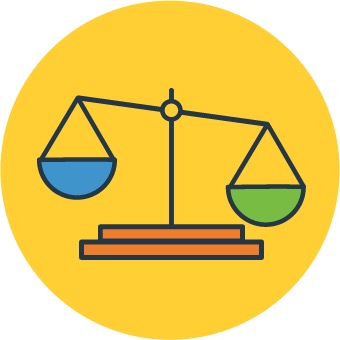
What is Responsible Decision-Making? The abilities to make caring and constructive choices about personal behavior and social interactions across diverse situations. This includes capacities to consider ethical standards and safety concerns, and to evaluate the benefits and consequences of various actions for person, social, and collective well-being. (CASEL, 2022)
- Demonstrating curiosity and open-mindedness
- Identifying solutions for personal and social problems
- Anticipating and evaluating the consequences of one’s actions
- Reflecting on one’s role to promote personal, family, and community well-being
Check out this video to learn ways to teach children to make responsible decisions by developing the ability to think through all parts of a problem, analyzing a situation, understanding its ethical implications, and evaluating the consequences.
Let’s dig a little deeper….
As humans, our brains aren’t fully developed until around age 25. Those of us over 25 rely on the prefrontal cortex (the “rational” part of the brain) to make sound, responsible decisions. However, research shows children, teens, and young adults use the amygdala—the “emotional” or “reactionary” part of the brain—to make decisions. Because the connection between the prefrontal cortex and the amygdala is still a work in progress for young people, our students often base their judgements on their emotions, rather than considering long-term consequences (The Connecting Link; Stanford Children’s Health).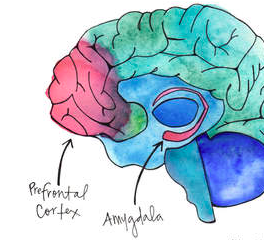
There is good news here: we can help students strengthen the connection between the prefrontal cortex and the amygdala by supporting a student to examine the possible outcomes based on their chosen course of action. Oftentimes, children (or even grown adults) act on emotion and bypass evaluating the benefits and consequences of their actions. Leading students through the decision-making process with intention helps build capacity in their ability to make choices that best serve them and others. In doing so, we also support the student to respond (pause, evaluate consequences, and make a constructive decision that considers all parties involved) rather than react.
Here are several ways you can support students to learn and demonstrate responsible decision-making:
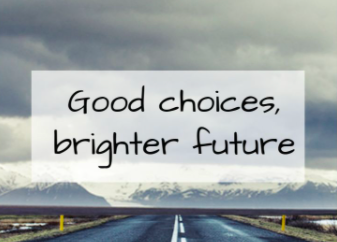 Connect Choices Now with Future Goals – Support students to see the connection between choices and actions they are taking now with their future goals. Ask students to make a list of their favorite classes, hobbies, and other preferred activities. Have students consider career opportunities of interest that align with their lists. Give students time to research the education, training, and other commitments involved with their career choices. Discuss how the choices they make today will impact their future goals (both positively and negatively. (The Connecting Link).
Connect Choices Now with Future Goals – Support students to see the connection between choices and actions they are taking now with their future goals. Ask students to make a list of their favorite classes, hobbies, and other preferred activities. Have students consider career opportunities of interest that align with their lists. Give students time to research the education, training, and other commitments involved with their career choices. Discuss how the choices they make today will impact their future goals (both positively and negatively. (The Connecting Link).
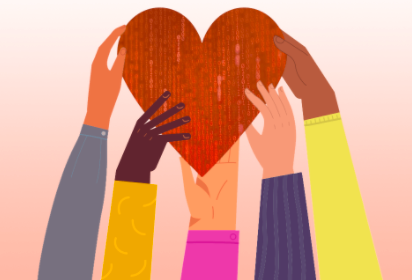 Reflect and Use Empathy – We don’t always make the right decisions. In fact, oftentimes we learn the biggest lessons when we don’t make the best decision. Make sure you give your students freedom to make mistakes and create an open and safe space to reflect on those mistakes. Decision-making grows stronger when students have the opportunity to navigate challenging situations on their own.
Reflect and Use Empathy – We don’t always make the right decisions. In fact, oftentimes we learn the biggest lessons when we don’t make the best decision. Make sure you give your students freedom to make mistakes and create an open and safe space to reflect on those mistakes. Decision-making grows stronger when students have the opportunity to navigate challenging situations on their own.
Reflection Questions:
What’s the last big mistake that you made? What did you learn from it? What happened? How was this important to you? How did your decision impact the future?
Another useful practice is using empathy skills (from the social awareness competency) to take the opposing viewpoint in the decision-making process so the student has a greater understanding of the various perspectives and potential outcomes. Similarly, you can ask students “What advice would you give a friend?”—a great way to tap into their “inner wisdom” on a topic.
 Incorporate Ethics and Morals into Decision-Making – There are several factors that impact our decision-making—some of which can be useful, some of which can get in the way. Bias, the natural human tendency to favor one thing over another, can get in the way of making good decisions. Supporting students to increase their self-awareness to examine their own beliefs and biases will bolster their ability to make ethical and socially responsible decisions. Introducing ethical dilemmas in the classroom can open up opportunities not only for debate and critical thinking, but also for personal growth, empathy for other viewpoints, and self-reflection, because students learn to navigate their own moral decision-making (Lee, 2019). Use academic content to challenge your students to think critically about their own morals and ethics. For example, examining and discussing the roles of historical figures and characters from novels, as well as people involved with current events can provide valuable teaching moments.
Incorporate Ethics and Morals into Decision-Making – There are several factors that impact our decision-making—some of which can be useful, some of which can get in the way. Bias, the natural human tendency to favor one thing over another, can get in the way of making good decisions. Supporting students to increase their self-awareness to examine their own beliefs and biases will bolster their ability to make ethical and socially responsible decisions. Introducing ethical dilemmas in the classroom can open up opportunities not only for debate and critical thinking, but also for personal growth, empathy for other viewpoints, and self-reflection, because students learn to navigate their own moral decision-making (Lee, 2019). Use academic content to challenge your students to think critically about their own morals and ethics. For example, examining and discussing the roles of historical figures and characters from novels, as well as people involved with current events can provide valuable teaching moments.
February is Healthy Relationships Month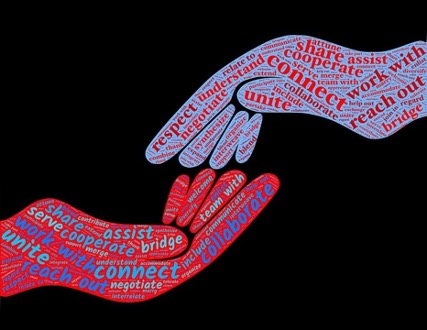
Why are healthy relationships important?
Positive human connection plays an important role in maintaining our emotional-physical health, wellbeing, and growth. In fact, research has shown that positive relationships encourage us to embrace and pursue opportunities that foster a sense of purpose and meaning in life. This is primarily because of the support that comes from a healthy relationship. In the face of adversity, healthy relationships and the positive support they offer, not only buffer us from the harms of stress but allow us to flourish despite these harms.
Healthy Relationships vs. Unhealthy Relationships
Healthy relationships allow the individuals in the relationship to feel supported and connected but still feel independent. They involve honesty, trust, respect and open communication between partners and take effort and compromise from both people. Unhealthy relationships are relationships where one or more of the people involved exhibits behaviors that are not healthy and are not founded in mutual respect for the other person. Unhealthy relationships are not necessarily abusive relationships, but they can be. They also aren’t limited to romantic relationships. Unhealthy relationships include but aren’t limited to friendships and relationships with family members.
10 Ways to Have a Healthy Relationship
Healthy relationships take practice! Here are some tips for building not only healthy romantic relationships, but also friendships with peers, family, and coworkers.
- COMMUNICATE – Be willing to have open and honest dialogue and freely communicate emotions, problems, desires, expectations, etc. to one another.
- PROBLEM SOLVE – Find solutions to problems where both people feel happy and satisfied. Compromise so each person is happy with the decision.
- SHARE POWER – Take mutual responsibility and have equal influence on the relationship. Make decisions together.
- USE NON-THREATENING BEHAVIOR – Talk and act so that expressing feelings is comfortable. Act in a way that creates a safe feeling and environment.
- TRUST AND SUPPORT EACH OTHER – Support each other’s goals in life. Respect each other’s right to their own feelings, friends, activities and opinions.
- BE HONEST AND ACCOUNTABLE – Accept responsibility for oneself. Admit being wrong. Communicate openly and truthfully.
- ENCOURAGE PERSONAL GROWTH – Encourage individual growth and freedom. Support each other’s goals in life.
- NEGOTIATE AND BE FAIR – Have an argument that ends with a compromise with which both people are happy and satisfied.
- BE SELF-CONFIDENT – Respect each other’s personal identity. Support each other’s self-worth.
- GIVE AND EXPECT RESPECT – Listen without expressing judgment. Be emotionally affirming and understanding. Value the opinions of others. Have a balance of giving and receiving.
School counselors serve as advocates for students. They proactively educate students about SEL and support students with addressing social emotional issues that can serve as barriers to success in school and beyond. School counselors also work collaboratively with other stakeholders to promote an equitable learning environment where all students feel respected and valued.
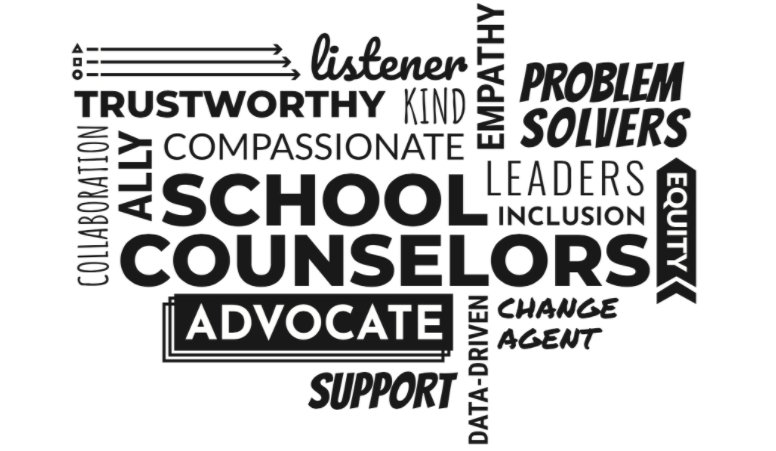 Professional school counselors play a critical role in ensuring that students get opportunities to have safe, enriching experiences in and out of school, and in helping prepare students for postsecondary success — all in ways that meet their individual needs. The combination of their training and experience make them a unique and integral part of the total educational program.
Professional school counselors play a critical role in ensuring that students get opportunities to have safe, enriching experiences in and out of school, and in helping prepare students for postsecondary success — all in ways that meet their individual needs. The combination of their training and experience make them a unique and integral part of the total educational program.
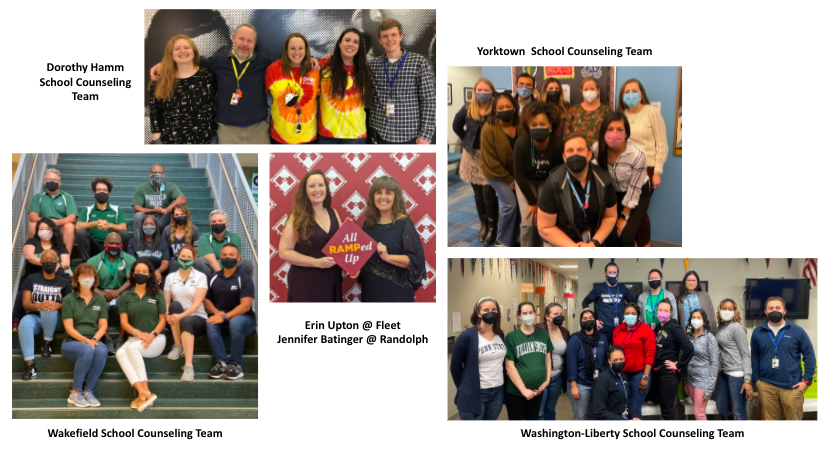
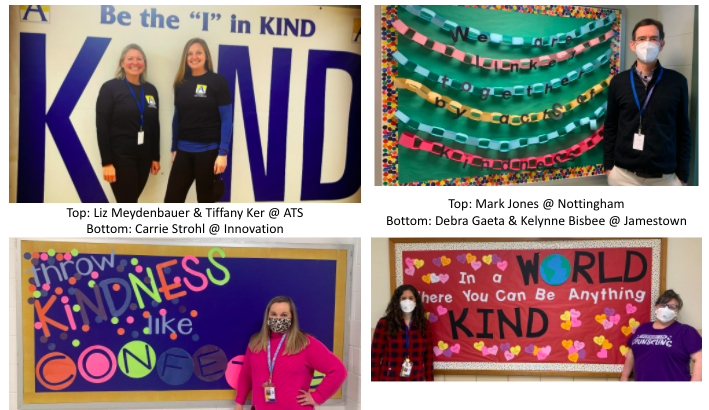
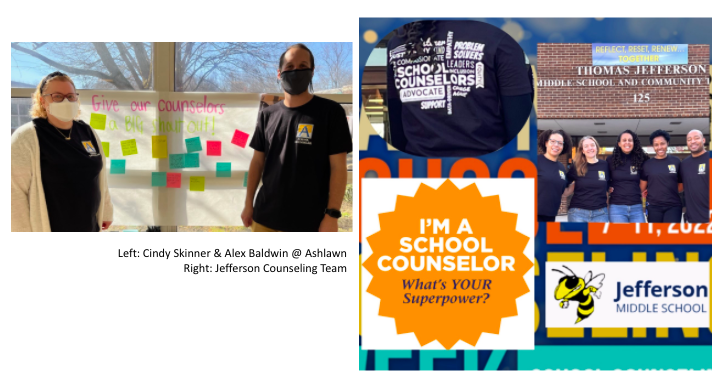
As mental health professionals, school counselors serve as leaders in school-wide SEL implementation efforts by:
- Collaborating with classroom teachers to provide the school counseling curriculum to all students through direct instruction, team teaching, or providing lesson plans for learning activities or units in classrooms aimed at social emotional development (ASCA, 2019);
- Providing professional development to promote a deeper understanding of SEL and Adult SEL to both staff and families;
- Leading meetings that empower student voice (examples can include student focus groups, facilitation of courageous conversations, or restorative justice circles);
- Collecting and analyzing data on school-wide SEL implementation efforts that includes identifying students who need additional support; and
- Providing small groups or individual counseling sessions to students to address social emotional needs requiring intensive support.
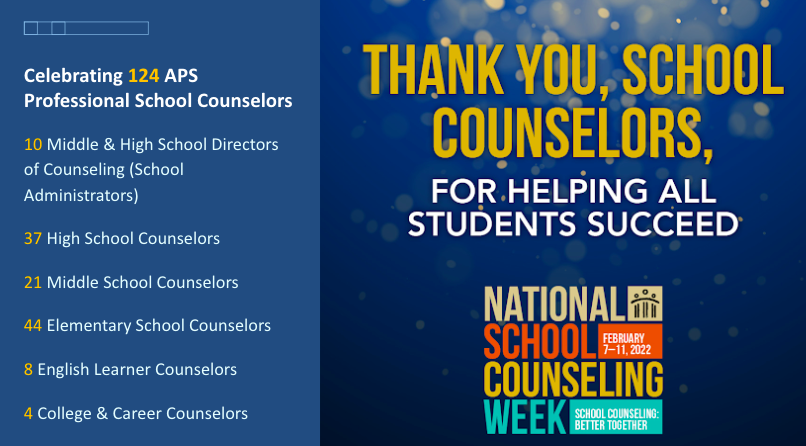
Learn more about school counselors here.
UPCOMING: APS Social-Emotional Learning Survey
We invite you to visit our webpage to view survey questions, FAQ’s about and learn more about the development of the APS SEL Survey from Panorama
WHAT IS SOCIAL-EMOTIONAL LEARNING?
Social-emotional learning (SEL) describes the mindsets, skills, attitudes, and feelings that help students succeed in school, career, and life. At its core, SEL focuses on students’ fundamental needs for motivation, social connectedness, and self-regulation as prerequisites for learning. Educators may also refer to SEL as “non-cognitive skills,” “soft skills,” “21st century skills,” “character strengths,” and “whole child development.”
Social-emotional learning is an important part of a well-rounded education. A 2017 meta-analysis from CASEL (the Collaborative for Academic, Social, and Emotional Learning) shows that investment in SEL has led to improved classroom behavior, better stress management, and 13 percent gains in academics.
A 2019 report from the Aspen Institute, “From a Nation at Risk to a Nation at Hope,” compiles evidence confirming that supporting students’ social, emotional, and cognitive development relates positively to traditional measures like attendance, grades, test scores, graduation rates, college and career readiness, and overall well-being. Research also shows that promoting student SEL starts with adults. In order to cultivate student SEL, caring adults in school buildings need to feel supported and validated. Adult social-emotional learning is the process of helping educators build their expertise and capacity to lead, teach, and model SEL. It involves cultivating adults’ own social and emotional competencies, wellbeing, and cultural competency, as well as a positive school climate that promotes SEL.
What does the screener measure?
The SEL screener is aligned with CASEL’s nationally recognized model for SEL, which addresses five broad and interrelated areas of competence: self-awareness, self-management, social awareness, relationship skills, and responsible decision-making. This summer, the Virginia Department of Education (VDOE) released SEL Guidance Standards, which highlight examples of each of these competencies. Of note, key examples of social awareness include the ability to understand broader historical and social contexts’ impact on humanity, and to empathize with and show gratitude for others, including those with different and diverse perspectives, abilities, backgrounds, and cultures. Similarly, key examples of relationship skills include the ability to apply communication and listening skills to interact with others, form and maintain positive relationships, and resolve conflict constructively, and to effectively collaborate and navigate relationships while valuing different and diverse perspectives, abilities, backgrounds, and cultures.
HOW CAN SCHOOLS MEASURE SOCIAL-EMOTIONAL LEARNING?
By asking students to reflect on SEL through surveys, APS can gather actionable data to prioritize supports. Panorama’s SEL Survey helps educators measure and improve SEL in the following areas:
- Skills and Competencies: The social, emotional, and motivational skills that help students excel in school, career, and life. Example topics: Growth Mindset, SelfEfficacy, Social Awareness
- Supports and Environment: The environment in which students learn, which influences their academic success and social-emotional development. Example topics: Sense of Belonging
- Well-Being: Students’ positive and challenging feelings, as well as how supported they feel through relationships with others. Example topics: Positive Feelings.
LEARN MORE: Youth Mental Health First Aid Training Available to Staff & Parents
The Office of Student Services continues to be committed to training all new staff and re-certifying staff in Youth Mental Health First Aid (YMHFA). This is a 6-hour course that teaches how to identify, understand, and respond to signs of mental illnesses and substance use disorders. Registration for staff is through Frontline. Parents can register by calling the Office of Student Services at 703-228-6062. Training will be provided every month for the remainder of the year.Upcoming session dates are: March 10, March 31, April 27, and May 10.
LEARN MORE: What can YOU do to prevent child abuse?
Darkness to Light is a Nation-Wide prevention and awareness program that empowers adults to prevent child abuse. The Arlington County Child Advocacy Center is hosting training sessions that are a part of the “Darkness to Light” program and are open to the public. Multiple trainings are available in either English or Spanish.
- Stewards of Children (2 ½ hours)- Learn how to prevent, recognize, and react responsibly to child sexual abuse.
- Healthy Touching (1 hour)- Learn how to balance children’s needs for warmth and affection with safe, respectful ways of interacting.
- Talking with Children about Safety from Sexual Abuse (1 hour)- Learn to have age-appropriate, open conversations about our bodies, sex, and boundaries.
- Bystanders Protecting Children from Boundary Violations and Sexual Abuse (1 hour)- Learn to describe behavior. Set limits. Move on. Always make sure the person who has violated the boundary is willing to follow the limit you set.
- Commercial Sexual Exploitation of Children (I hour)- Learn about commercial sexual exploitation, which is a form of sexual abuse and should not be mistaken for as child’s consent.
Darkness to Light training sessions can also be scheduled and tailored for professional/ community groups on other dates and times.To register for or discuss scheduling any of these Darkness to Light trainings go to https://www.signupgenius.com/go/20F0A45ACA829A6FD0-stewards1.
Contact Jennifer Gross at 703-228-1561 or [email protected] for more information.
Resources: CIGNA School Support Line – OPEN TO ALL
Don’t do it alone. There are many reasons to seek help. Some are common, others more serious. Either way, talk with us today if you or a family member are dealing with: Anxiety, Depression, Abuse, Eating disorders, Bullying, Self-harm, Addiction, Peer Pressure, Suicidal thoughts or anything else. No one has to be a Cigna customer to call. If you go to school, or have a child who goes to school, the School Support Line was created for you.This is a no-cost, confidential service that puts students and families in touch with mental health professionals who know how to listen, ask the right questions, and offer advice. And it’s available around the clock for you and for members of your family. 833-MeCigna (833-632-4462) We’re here 24/7/365!
- School Support Line Spanish
- School Support Line Amharic
- School Support Line Arabic
- School Support Line Mongolian
- School Support Line English
Resources:
Intake/Same Day Access (703-228-1560) Beginning December 20, 2021, Same Day Access/Intakes will be scheduled through 703-228-1560. Visit our website: Children’s Behavioral Healthcare – Official Website of Arlington County Virginia Government (arlingtonva.us) for updated information on how to access mental health and substance use treatment services.
Anyone ages 21 and under experiencing an urgent mental health need is encouraged to contact CR2 (844-627-4747) and anyone experiencing a psychiatric emergency is encouraged to contact Emergency Services (703-228-5160). We will provide an intake assessment to children who are returning to the community from acute psychiatric hospitalization — please call to coordinate.
REACH – Region II (855) 897-8278 If someone you care about, who has an intellectual or developmental disability, is experiencing a crisis due to behavioral or psychiatric needs, the REACH program can help. REACH is the statewide crisis system of care that is designed to meet the crisis support needs of individuals who have a developmental disability and are experiencing crisis events that put them at risk for homelessness, incarceration, hospitalization and/or danger to self or others.
For non-urgent, but concerning behavior, access resources through Arlington Children’s Behavioral Health by clicking here.
Local, Free Food Distributions
| Capital Area Food Bank has several monthly food distribution sites in Arlington available for individuals and families in need. Produce is distributed for free, and no registration is required! The Capital Area Food Bank’s Community Marketplace takes place at Arlington Mill Community Center, 909 S. Dinwiddie St., on the 4th Saturday of every month at 9 a.m. Capital Area Food Bank also distributes at a Mobile Market at 700 S Buchanan St, on the 2nd Thursday of the month from 3 p.m. – 5 p.m. For a full list of local Mobile Market food distributions, view and share this flyer in English and Spanish, or call the information line at (202) 769-5612. |
Student Services Newsletter January 2022
The SEL theme for January is Self-Management. This month’s newsletter highlights ways for parents to support self-management skill development, as well as several book recommendations for young readers. January is also National Mental Wellness Month. Read for ways to encourage resilience in children, a key factor in mental wellness, and tips for adults to improve mental wellness. Lastly, don’t miss the upcoming trainings available to parents, as well as the free and available to all, Cigna Student School Support Line.
SEL Focus: Self-Management
What is Self-Management? The ability to successfully regulate one’s emotions, thoughts, and behaviors in different situations — effectively managing stress, controlling impulses, and motivating oneself. The ability to set and work toward personal and academic goals.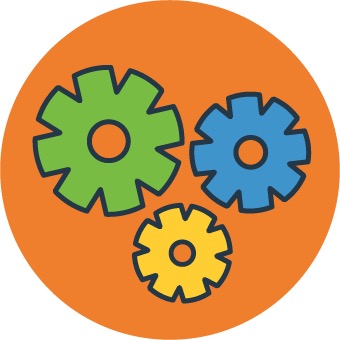
- Impulse control
- Stress management
- Self-discipline
- Self-motivation
- Goal-setting
- Organizational skills
Check out this video to learn how to teach children ways to manage their feelings and turn them into positive actions, including creating a calm and regulated environment, showing how to manage impulses, and discussing ways to resolve conflicts.
Ways to Build Self-Management Skills
- Prioritize your health and well-being. Eating right and sleeping well help you do your best work and productively interact with your colleagues. …
- Know your strengths. …
- Focus on one task at a time. …
- Develop an organizational system. …
- Set short- and long-term goals for yourself.
Books to help teach kids about Self-Management
 Big Nate Lives it Up | Lincoln Peirce
Big Nate Lives it Up | Lincoln Peirce
Principal Nichols asks Nate—you may recognize him from the Big Nate comic strip—to look after the new kid. Breckenridge Puffington III is no fun at all. But there seems to be something strange and familiar about him. THEMES: Compassion, Emotion Management, Empathy, Feelings, Friendship, Problem, Solving,Understanding Perspectives
El Deafo | Cece Bell
Cece is self-conscious about her huge hearing aid. Then she discovers she can listen in on teachers’ conversations, and her deafness starts to feel like a superpower! Will it help her to conquer her loneliness and find a real friend? THEMES: Being Assertive, Emotion Management, Feelings, Friendship
Fish in a Tree | Lynda Mullaly Hunt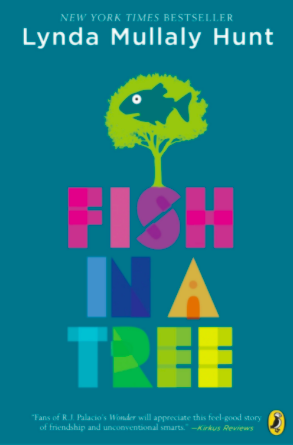
Ally can’t read, but none of her teachers have noticed. Until now, she’s fooled everyone by changing schools and disrupting class. But her new teacher sees how bright she is, and helps her understand and cope with her dyslexia. THEMES: Being Assertive, Emotion Management, Feelings, Problem Solving,Understanding Perspectives

The Girl Who Drank the Moon | Kelly Barnhill
This lyrical fantasy novel tells the story of a girl who, after being abandoned by her village, is being raised by the good witch who accidentally gave her some troublesome magical powers. THEMES: Consequences, Emotion Management, Feelings, Problem Solving
 Inside Out and Back Again | Thanhha Lai
Inside Out and Back Again | Thanhha Lai
Hà flees Saigon with her family during the Vietnam war. Her life as a refugee is strange and frightening, but her bond with her family is strong. The story is told inverse, and is based on the author’s experience. THEMES: Being Assertive, Emotion Management, Feelings
 Janna and the Kings | Patricia Smith
Janna and the Kings | Patricia Smith
Janna spends every Saturday with Granddaddy, and her favorite part is their visit to the barbershop. There, Grandaddy and his friends look like kings on their thrones.When Grandaddy dies, Janna fears she’s lost all the kings.THEMES: Compassion, Emotion Management, Feelings, Friendship
January is National Mental Wellness Month
In addition to keeping children physically safe during the pandemic, it is also important to care for their emotional health. The threat of COVID-19, long-term social distancing, and prolonged disruption to the school routine may create significant stress and impact children’s mental well-being. (Check out the complete VDOE resource here https://www.doe.virginia.gov/support/prevention/quick-guide-se-wellness-parents.pdf)
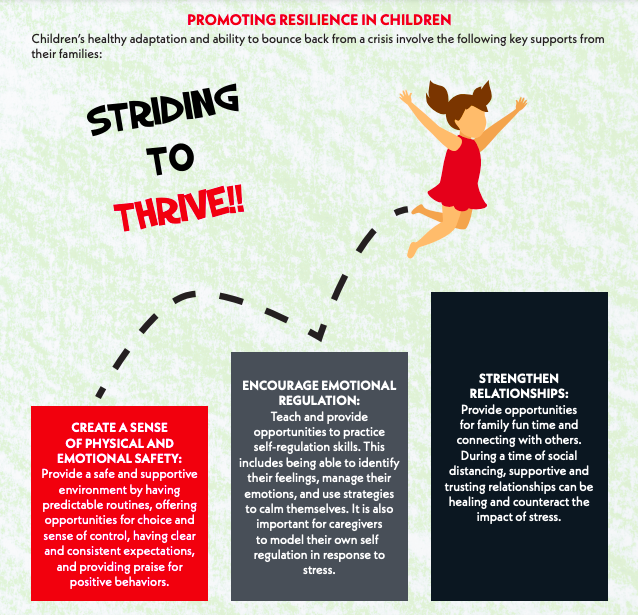
This month is dedicated to being mindful about your own mental and emotional wellness. Students are juggling a lot of different things in these times and what is often lost is to take time for oneself. In these stressful times, it can be very necessary and extremely beneficial for students to take a break and do something that they enjoy helping to relieve stress and anxiety. Mental wellness is about how all aspects of your life — the social, emotional, physical, spiritual, and intellectual — all come together for an overall state of well-being. Mental health and wellness affect all aspects of our lives. It helps determine how we act, feel, and think, and it affects our ability to handle stress, connect to other people, and to make decisions. Thus it’s important to improve our mental awareness in any way we can, some can be as simple as laughing or having a positive attitude. Here are some tips that can help everyone improve their mental wellness:
Develop a positive attitude — People with positive attitudes are happier, more successful, and better able to handle crises and stress. And in concert with a positive attitude, get an attitude of gratitude for what you have instead of dwelling on what you don’t.
— People with positive attitudes are happier, more successful, and better able to handle crises and stress. And in concert with a positive attitude, get an attitude of gratitude for what you have instead of dwelling on what you don’t.
 Avoid negative self-talk — Learn to be thankful for the good rather than focusing on the negative issues. Every time you catch yourself thinking a negative thought, say the words silently or out loud, “Cancel-Cancel” and then consciously shift it into a positive thought instead.
Avoid negative self-talk — Learn to be thankful for the good rather than focusing on the negative issues. Every time you catch yourself thinking a negative thought, say the words silently or out loud, “Cancel-Cancel” and then consciously shift it into a positive thought instead.
 View a crisis situation as an opportunity — Creative problem-solving can expand your options. Try to make a list of good things that could result from the problem you’re having to solve.
View a crisis situation as an opportunity — Creative problem-solving can expand your options. Try to make a list of good things that could result from the problem you’re having to solve.
 Connect with Others & Laugh – Having connection with others is a crucial element in protecting our mental health. Someone to share with and laugh with can keep us grounded and help us gain perspective. Remember, humor is a great stress-reducer. Studies indicate laughter can make you healthier.
Connect with Others & Laugh – Having connection with others is a crucial element in protecting our mental health. Someone to share with and laugh with can keep us grounded and help us gain perspective. Remember, humor is a great stress-reducer. Studies indicate laughter can make you healthier.
Exercise — Regular exercise increases energy and releases brain biochemicals to ward off depression and anxiety. It also relieves stress, improves memory, helps you sleep better, and boosts overall mood. Just a 15-minute walk a day will help keep body and soul together. 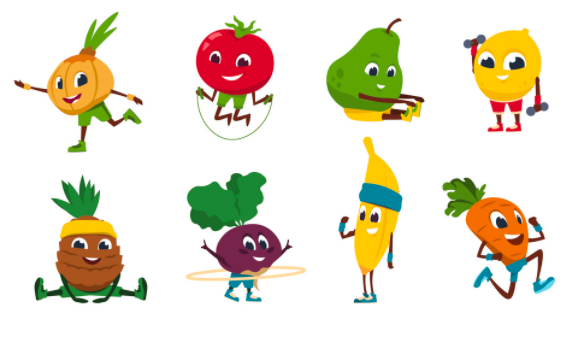
Improve your diet — During times of stress, you tend to skip meals or eat junk food. A diet rich in fruit, vegetables, and fiber will help you maintain the physical and mental stress you need to deal with the situation.
 Get enough rest — sleep disturbances are common during stress. Sometimes, the best thing you can do for your mental health is to get a good night’s sleep. The Mayo Clinic recommends that adults receive seven to nine hours of sleep per night.
Get enough rest — sleep disturbances are common during stress. Sometimes, the best thing you can do for your mental health is to get a good night’s sleep. The Mayo Clinic recommends that adults receive seven to nine hours of sleep per night.
 Take Some “Me Time” & Ask for Help if You Feel Overwhelmed – This can be anything from leisurely reading a book that you have been wanting to read or doing an activity just for yourself. Finding support for yourself in the people around you is also important for your overall well-being. Help can be just a phone call away.
Take Some “Me Time” & Ask for Help if You Feel Overwhelmed – This can be anything from leisurely reading a book that you have been wanting to read or doing an activity just for yourself. Finding support for yourself in the people around you is also important for your overall well-being. Help can be just a phone call away.
For more information go to https://www.americanmentalwellness.org/
LEARN MORE: Youth Mental Health First Aid Training Available to Staff & Parents
The Office of Student Services continues to be committed to training all new staff and re-certifying staff in Youth Mental Health First Aid (YMHFA). This is a 6-hour course that teaches how to identify, understand, and respond to signs of mental illnesses and substance use disorders. Registration for staff is through Frontline. Parents can register by calling the Office of Student Services at 703-228-6062. Training will be provided every month for the remainder of the year.Upcoming session dates are: February 8, March 10, March 31, April 27, and May 10.
LEARN MORE: Did you miss Dr. Christina Choi’s Social Emotional Learning Presentation in November?
The Student Services Advisory Committee invites you to watch a recording of their meeting featuring guest speakers Dr. Christina Choi and Dr. Peck Cho. Dr. Christina Choi is an author and presenter who appears regularly on TV and was the host of a very successful TV talk show in S. Korea. She has made more than a dozen TV documentaries on marriage, parenting & education. Her TV documentary on motherhood received a Best Program award, and she was chosen as one of the three most influential women in Korea. Dr. Peck Choi is Co-Founder and Co-Director with Dr. Choi of an Institute of Resilience and Positivity, which provides workshops for professionals. The Institute offers a free educational program to hundreds of daycare center staff and parents in impoverished areas and to workers of UNICEF. They have also worked with 22,000 orphans and children at risk in Korea, Philippines, Mexico, Brazil and Guatemala. Christina and Peck will be talking about how to make Social and Emotional Learning part of the culture. The recording is online at: https://youtu.be/uXNQyjhlT5w
LEARN MORE: What can YOU do to prevent child abuse?
Darkness to Light is a Nation-Wide prevention and awareness program that empowers adults to prevent child abuse. The Arlington County Child Advocacy Center is hosting training sessions that are a part of the “Darkness to Light” program and are open to the public. Multiple trainings are available in either English or Spanish.
- Stewards of Children (2 ½ hours)- Learn how to prevent, recognize, and react responsibly to child sexual abuse.
- Healthy Touching (1 hour)- Learn how to balance children’s needs for warmth and affection with safe, respectful ways of interacting.
- Talking with Children about Safety from Sexual Abuse (1 hour)- Learn to have age-appropriate, open conversations about our bodies, sex, and boundaries.
- Bystanders Protecting Children from Boundary Violations and Sexual Abuse (1 hour)- Learn to describe behavior. Set limits. Move on. Always make sure the person who has violated the boundary is willing to follow the limit you set.
- Commercial Sexual Exploitation of Children (I hour)- Learn about commercial sexual exploitation, which is a form of sexual abuse and should not be mistaken for as child’s consent.
Darkness to Light training sessions can also be scheduled and tailored for professional/ community groups on other dates and times.To register for or discuss scheduling any of these Darkness to Light trainings go to https://www.signupgenius.com/go/20F0A45ACA829A6FD0-stewards1.Contact Jennifer Gross at 703-228-1561 or [email protected] for more information.
Resources: CIGNA School Support Line – OPEN TO ALL
Don’t do it alone. There are many reasons to seek help. Some are common, others more serious. Either way, talk with us today if you or a family member are dealing with: Anxiety, Depression, Abuse, Eating disorders, Bullying, Self-harm, Addiction, Peer Pressure, Suicidal thoughts or anything else. No one has to be a Cigna customer to call. If you go to school, or have a child who goes to school, the School Support Line was created for you.This is a no-cost, confidential service that puts students and families in touch with mental health professionals who know how to listen, ask the right questions, and offer advice. And it’s available around the clock for you and for members of your family. 833-MeCigna (833-632-4462) We’re here 24/7/365!
- School Support Line Spanish
- School Support Line Amharic
- School Support Line Arabic
- School Support Line Mongolian
- School Support Line English
Resources: Know families that need support? New classes from SCAN (Stop Child Abuse Now)
Stop Child Abuse Now (SCAN) of Northern Virginia is the only region-wide organization focused solely on preventing child abuse and neglect across Northern Virginia. For 30 years, we have been committed to developing effective prevention programming for all children and families, no matter what their circumstances.
Nurturing Parents | English & Spanish – Wednesday’s January 26—March 16
For parents with children of all ages: Receive support in topics such as child development, praise and empathy, family rules and expectations, stress management and much more!
Strengthening Families | English – Thursday’s January 27—March 10
For parents and youth ages 10-14: Strengthen your family bond with discussions, games, projects, and much more. Families will discuss topics such as family stress, tobacco use, peer pressure, and more.
Family Coaching | English & Spanish
Open enrollment—-Meet weekly with a Family Coach to identify individualized goals and create a targeted family plan.
SCAN’s Family Programs in Northern Virginia.
SCAN of Northern Virginia
205 S Whiting St Ste 205
Alexandria, VA 22304-3632
Phone: (703) 820-9001
Student Services Newsletter December 2021
The SEL theme for December is Self Awareness. This months newsletter includes ways for parents to continue strengthening SEL skills at home with their children, as well as a Winter Well-Being series that offers bite-sized self-care tips and guides parents through simple practices to improve social and emotional well-being. We also highlight a recent event at Swanson Middle School that focused on building community, team-building and connection. Lastly, read more about the parent support groups and trainings available, as well as the free and available to all, Cigna Student School Support Line.
SEL Focus: Self-Awareness
Self-awareness: The ability to accurately recognize one’s emotions and thoughts and their influence on behavior. This includes accurately assessing one’s strengths and limitations and possessing a well grounded sense of confidence and optimism. (CASEL, 2021).
Skills that develop self-awareness are:
- Integrating personal and social identities
- Identifying personal, cultural, and linguistic assets
- Identifying one’s emotions
- Demonstrating honesty and integrity
- Linking feelings, values, and thoughts
- Examining prejudices and biases
- Experiencing self-efficacy
- Having a growth mindset
- Developing interests and a sense of purpose
Check out this video to learn how you can help children develop self-awareness, the foundation of social-emotional learning, by teaching the vocabulary of emotions, and modeling behavior that supports self-awareness.
How Do We Develop Self-Awareness?
Self-awareness is the ability to monitor our inner and external world. Our thoughts and feelings arise as signals. Developing self-awareness allows us to keep from being swept away by those signals, and instead, objectively and thoughtfully respond to them. Self-aware people understand their internal experience and their impact on the experience of others.Ways to Increase Self-Awareness
- A thought diary is a foundational place to begin increasing self-awareness.
- Keep track of thoughts that pop up in the form of an automatic reaction.
- Track what was occurring at the time.
- Track your level of emotion to the stimulus.
SEL Practices to Build Competencies at Home
Parents are the first teachers of SEL. Time with family over Winter Break means more opportunities to teach your child the concepts and skills of Social Emotional Learning (SEL). SEL is an ongoing process & not simply a strategy to address a specific behavior or situation. Everyday interactions parents have with their children are potential opportunities to build SEL competencies.
Practice at home: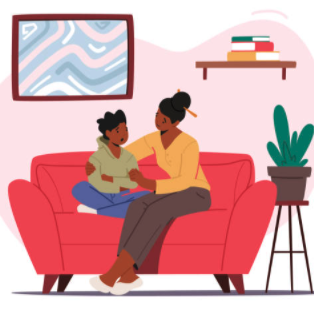
- Focus on Strengths- Helping your child identify strengths helps to build self-efficacy & the ability to persist through difficult times.
- Use Visuals for Planning- Check-lists & other visuals help children see what needs to be done to succeed, as well as experience pride as goals are met.
- Ask your child about feelings to help students build self-awareness & communication of needs.
- Stay calm when angry & model calm-down strategies. Explain to your child what you are doing & why.
- Be willing to apologize & admit when you’ve made a mistake.
- Build empathy by encouraging your child to help & share within your family & community.
Source: EdSurge
Self-Awareness and Self-Management
Please see the link below to explore how a better understanding of their own feelings and experiences can help children have better control of their actions. Parents will learn how to help their child become more aware of their emotions, their strengths and weaknesses, and what makes them an individual. That increased awareness will help them better manage their behavior and interactions with others. https://www.pbslearningmedia.org/resource/self-awareness-and-self-management-sel-video/social-emotional-learning/
APS Highlight: SEL in ACTION
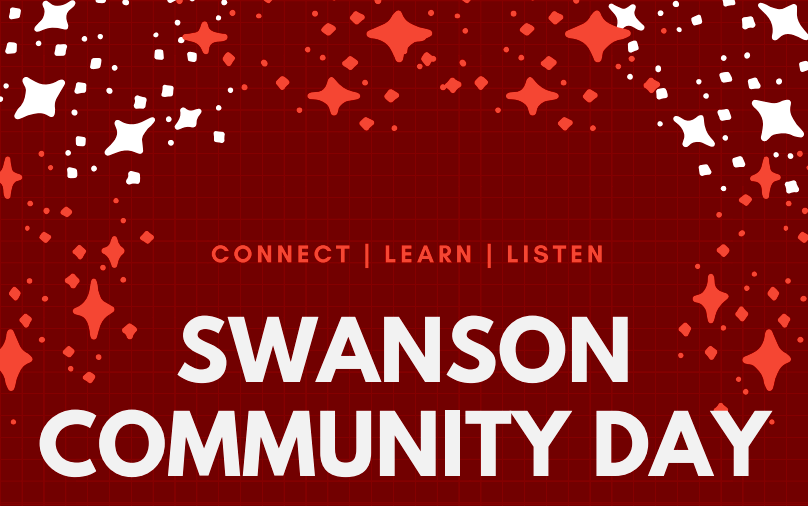
The Office of Student Services Staff coordinated the first ever Community Day at Swanson Middle School. On December 8th, all students and staff participated in a half day of learning and community building focused on communication, problem-solving, team building, and student voices. The lessons were all developed by the school counselors, school social worker, and school psychologist.
The goals of community day were to:
-
- Empower students to build skills to support social-emotional well-being, build community, build trusted adults/peers
- Support the district-wide initiative for the “whole student”
- Strengthen relationships and lessen detachment
- Develop a shared problem solving language
- Create schedules and lessons that are simple for teachers to execute
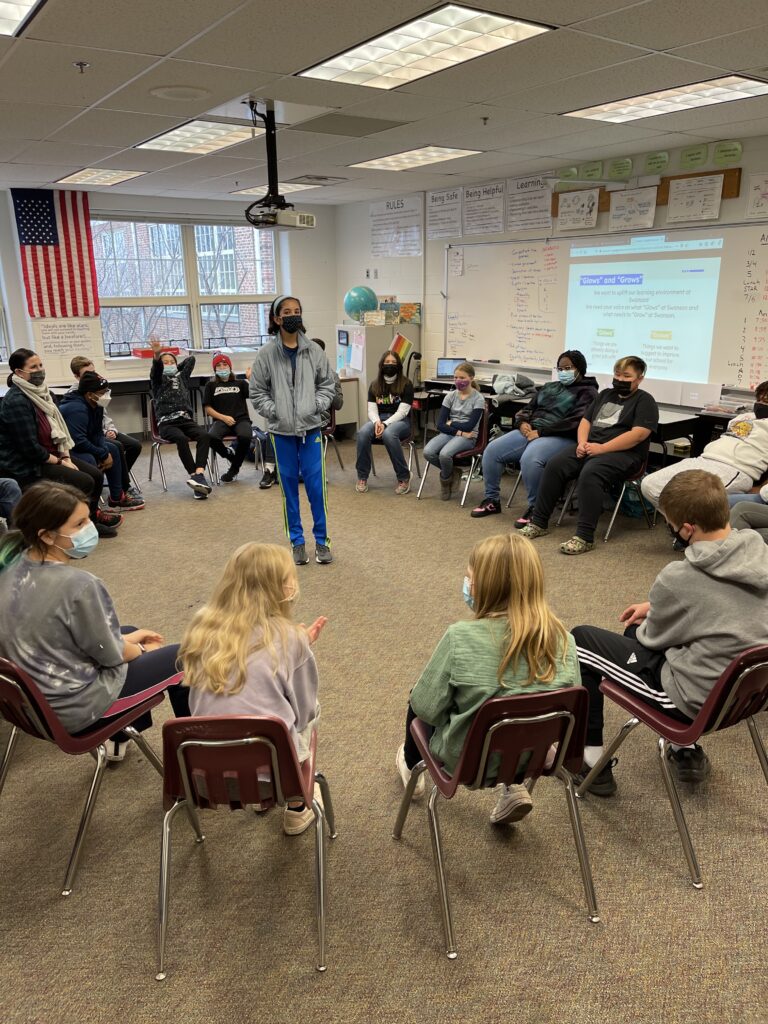
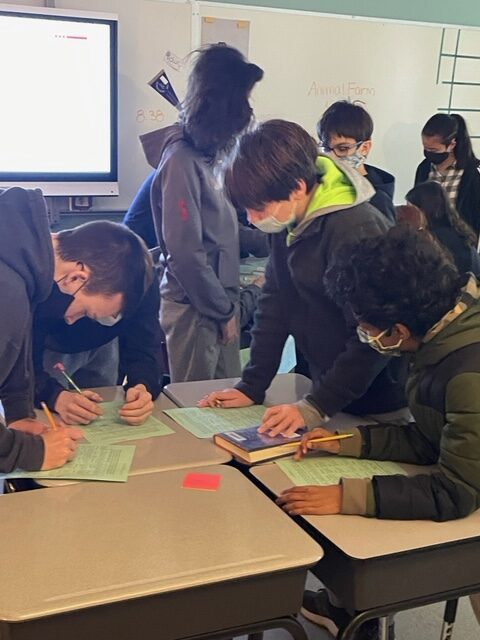
Students said they learned how to talk to each other and disagree effectively, way to calm down, how to make friends and work together, ways to listen, and how to be kind and caring to others. Students also commented that the event helped them feel that their voices were heard and they can make a difference. Staff commented that the event was well-organized and they appreciated the thoughtful planning, lessons, and activities.
National Impaired Driving Prevention Month
Each December, we go out for fun, parties and drinks with family and friends. But we ask you to stop and think for a second about being responsible. December is National Impaired Driving Prevention Month and since the holiday season has a higher accident rate than others on average, it is important to echo the message of consciousness of being in a proper state behind the wheel.
According to the National Safety Council, over 40,000 people died in alcohol-related traffic accidents last year. During the holidays, as traffic begins to build on our highways, the incident rate of accidents also increases. Sadly, these incidents often involve impaired drivers. There are 5 types of impairments to consider during this time: those that have consumed alcohol and/or drugs, fatigued drivers, distracted drivers, or someone suffering a medical emergency. During the month of December, law enforcement has consistently noted a significant increase in drinking and driving related incidents. According to the Department of Motor Vehicles in Virginia, 28 people die in drunk driving crashes every day in the U.S., or one every 51 minutes. In Virginia, 35% of all traffic fatalities involve alcohol. According to the Virginia Crime Report, there were 17,028 DUI arrests in 2020 (Virginia State Police, 2020).
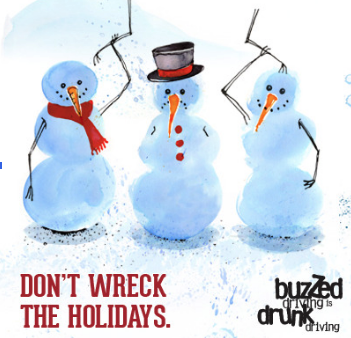 Since 1981, high officials all across America have worked their hardest promoting the importance of staying sober while driving during the month of December, proclaimed National Impaired Driving Prevention Month, and it all stemmed from one woman and her resolve.
Since 1981, high officials all across America have worked their hardest promoting the importance of staying sober while driving during the month of December, proclaimed National Impaired Driving Prevention Month, and it all stemmed from one woman and her resolve.
On May 3, 1980, thirteen-year-old Cari Lightner was struck and killed by Clarence Busch in a drunk driving accident. When police arrested Clarence, they found this was not his first occurence, even down to a hit-and-run drunk driving fine less than a week before his accident with Cari. At the time, driving while intoxicated was a misdemeanor that was barely prosecuted, meaning that Busch was very unlikely to have gone to jail.
This unacceptable fact motivated Cari’s mother, Candy Lightner, to take action. The result was the non-profit organization known as MADD, Mothers Against Drunk Driving. Candy’s movement quickly grew across the nation. She pushed for a more strict definition of what drunk driving was, having legislators pass stricter laws and prosecutions that included jail time and license suspensions, up to having President Reagan establish 21 as the minimum drinking age and appointing Lightner as part of a commission developed to tackle the issue.
As you prepare for the holidays, if you are traveling, here are some points to consider as you observe others sharing the roads with you: tailgating, weaving in and out of traffic or zigzagging across the road, almost striking an object, curb, or vehicle, stopping without cause or erratic braking, and/or drifting in and out of traffic lanes. If you see something, say something, please call or text 911 for further assistance. Let’s keep our loved ones safe during this joyous time of the year!
Mental Health Corner

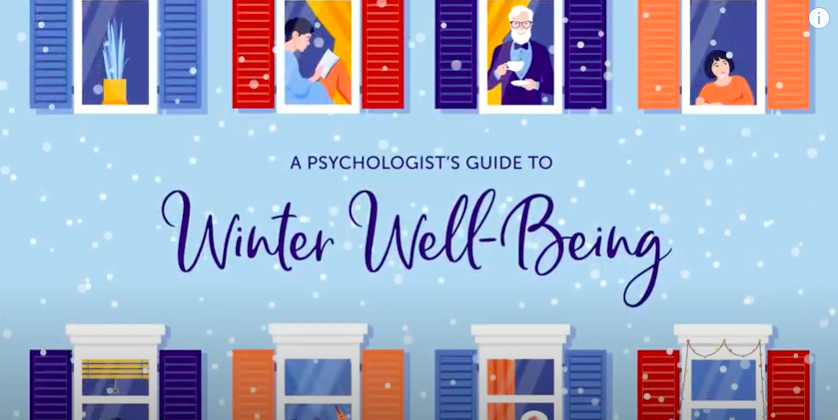 Winter Well-Being Series: “A Psychologist’s Guide to Winter Well-Being” is a therapist-led video series from Committee for Children to support parents’ mental health. The 8-week series is designed to encourage parents to prioritize their mental health as winter approaches, offering evidence-based advice and a weekly self-care prescription. All eight weekly videos feature Dr. Mylien Duong, licensed clinical psychologist and senior research scientist at Committee for Children. Dr. Duong gives viewers bite-sized self-care tips and guides them through simple practices to improve social and emotional well-being: Week 1: Self-CompassionWeek 2: Managing Holiday StressWeek 3: Being Present with FamilyWeek 4: Resolutions That StickWeek 5: Setting Your IntentionsWeek 6: Making Time for JoyWeek 7: Listening to UnderstandWeek 8: Expressing Gratitude
Winter Well-Being Series: “A Psychologist’s Guide to Winter Well-Being” is a therapist-led video series from Committee for Children to support parents’ mental health. The 8-week series is designed to encourage parents to prioritize their mental health as winter approaches, offering evidence-based advice and a weekly self-care prescription. All eight weekly videos feature Dr. Mylien Duong, licensed clinical psychologist and senior research scientist at Committee for Children. Dr. Duong gives viewers bite-sized self-care tips and guides them through simple practices to improve social and emotional well-being: Week 1: Self-CompassionWeek 2: Managing Holiday StressWeek 3: Being Present with FamilyWeek 4: Resolutions That StickWeek 5: Setting Your IntentionsWeek 6: Making Time for JoyWeek 7: Listening to UnderstandWeek 8: Expressing Gratitude
LEARN MORE: Youth Mental Health First Aid Training Available to Staff & Parents
The Office of Student Services continues to be committed to training all new staff and re-certifying staff in Youth Mental Health First Aid (YMHFA). This is a 6-hour course that teaches how to identify, understand, and respond to signs of mental illnesses and substance use disorders. Registration for staff is through Frontline. Parents can register by calling the Office of Student Services at 703-228-6062. Training will be provided every month for the remainder of the year.Upcoming session dates are: January 13, February 8, March 10, March 31, April 27, and May 10.
LEARN MORE: Did you miss Dr. Christina Choi’s Social Emotional Learning Presentation in November?
The Student Services Advisory Committee invites you to watch a recording of their meeting featuring guest speakers Dr. Christina Choi and Dr. Peck Cho. Dr. Christina Choi is an author and presenter who appears regularly on TV and was the host of a very successful TV talk show in S. Korea. She has made more than a dozen TV documentaries on marriage, parenting & education. Her TV documentary on motherhood received a Best Program award, and she was chosen as one of the three most influential women in Korea. Dr. Peck Choi is Co-Founder and Co-Director with Dr. Choi of an Institute of Resilience and Positivity, which provides workshops for professionals. The Institute offers a free educational program to hundreds of daycare center staff and parents in impoverished areas and to workers of UNICEF. They have also worked with 22,000 orphans and children at risk in Korea, Philippines, Mexico, Brazil and Guatemala. Christina and Peck will be talking about how to make Social and Emotional Learning part of the culture. The recording is online at: https://youtu.be/uXNQyjhlT5w
LEARN MORE: What can YOU do to prevent child abuse?
Darkness to Light is a Nation-Wide prevention and awareness program that empowers adults to prevent child abuse. The Arlington County Child Advocacy Center is hosting training sessions that are a part of the “Darkness to Light” program and are open to the public. Multiple trainings are available in either English or Spanish.
- Stewards of Children (2 ½ hours)- Learn how to prevent, recognize, and react responsibly to child sexual abuse.
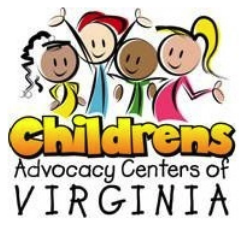
- Healthy Touching (1 hour)- Learn how to balance children’s needs for warmth and affection with safe, respectful ways of interacting.
- Talking with Children about Safety from Sexual Abuse (1 hour)- Learn to have age-appropriate, open conversations about our bodies, sex, and boundaries.
- Bystanders Protecting Children from Boundary Violations and Sexual Abuse (1 hour)- Learn to describe behavior. Set limits. Move on. Always make sure the person who has violated the boundary is willing to follow the limit you set.
- Commercial Sexual Exploitation of Children (I hour)- Learn about commercial sexual exploitation, which is a form of sexual abuse and should not be mistaken for as child’s consent.
Darkness to Light training sessions can also be scheduled and tailored for professional/ community groups on other dates and times.To register for or discuss scheduling any of these Darkness to Light trainings go to https://www.signupgenius.com/go/20F0A45ACA829A6FD0-stewards1.Contact Jennifer Gross at 703-228-1561 or [email protected] for more information.
Resources: CIGNA School Support Line – OPEN TO ALL
Don’t do it alone. There are many reasons to seek help. Some are common, others more serious. Either way, talk with us today if you or a family member are dealing with: Anxiety, Depression, Abuse, Eating disorders, Bullying, Self-harm, Addiction, Peer Pressure, Suicidal thoughts or anything else. No one has to be a Cigna customer to call. If you go to school, or have a child who goes to school, the School Support Line was created for you.This is a no-cost, confidential service that puts students and families in touch with mental health professionals who know how to listen, ask the right questions, and offer advice. And it’s available around the clock for you and for members of your family. 833-MeCigna (833-632-4462) We’re here 24/7/365!
- School Support Line Spanish
- School Support Line Amharic
- School Support Line Arabic
- School Support Line Mongolian
- School Support Line English
Student Services Newsletter November 2021
The SEL theme for November is Social Awareness. APS Staff will focus on helping students develop their empathy muscle through lessons and activities. This month we also celebrate our school psychologists and the important work they do to help students thrive. In addition, all 8th and 10th grades are receiving a lesson from the Signs of Suicide program. The SOS Program is the only youth suicide prevention program that has demonstrated an improvement in students’ knowledge and adaptive attitudes about suicide risk and depression, as well as a reduction in actual suicide attempts. Lastly, read more about the parent support groups and trainings available, as well as the free and available to all, Cigna Student School Support Line.
SEL Focus: Social Awareness
The ability to adopt the perspective of other people and to empathize with other people from diverse backgrounds and cultures. A person who is socially aware understands social and ethical norms for behavior and recognizes family, school, and community resources and support.
Skills that develop social awareness include:
- Identifying social cues (verbal, physical) to determine how others feel
- Taking others’ perspectives
- Demonstrating empathy and compassion
- Showing concern for the feelings of others
- Understanding and expressing gratitude
- Recognizing strengths in others
- Identifying diverse social norms, including unjust ones
- Recognizing situational demands and opportunities
- Caring about and being motivated to contribute to the well-being of one’s family, friends, school, community, the environment, and the greater good
- Appreciating diversity
- Respect of others
Empathy and kindness can positively affect children in their social and academic lives. Teaching these skills is a big part of the Second Step social-emotional learning program.
Books About Empathy and Kindness for Early Learners
By: Committee for Children (Find more here – 12 Recommended Children’s Books about Empathy & Kindness)
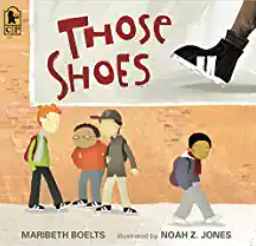 Those Shoes by Maribeth Boelts, illustrated by Noah Z. Jones
Those Shoes by Maribeth Boelts, illustrated by Noah Z. Jones
Jeremy really wants the shoes that all the kids are wearing. The problem is that his family can’t afford them. Jeremy will do most anything to own a pair— including squeeze into a pair on sale that is a size too small. Jeremy soon discovers the “uncomfortable” consequences of this solution and begins to appreciate what he already has. (caring, compassion, consequences, friendship, helping, name-calling, problem-solving, thinking of solutions)
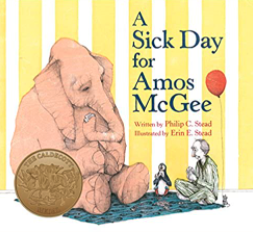 A Sick Day for Amos McGee by Philip C. Stead, illustrated by Erin E. Stead
A Sick Day for Amos McGee by Philip C. Stead, illustrated by Erin E. Stead
Amos McGee works at the zoo. Amos always finds time each day to spend in special ways with five of his animal friends. One day Amos is sick. His friends then get a chance to do something special for Amos. (caring, compassion, empathy, feelings, helping, understanding perspectives)
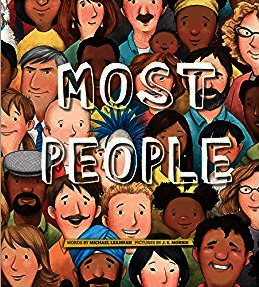 Most People by Michael Leannah, illustrated by Jennifer E. Morris
Most People by Michael Leannah, illustrated by Jennifer E. Morris
When the world looks scary, it’s reassuring to remember that most people want to be kind, helpful, loving, and funny. This book meanders through a busy city, showing all kinds of people helping, playing, and sharing. (compassion, feelings)
APS Highlight: SEL in ACTION
The No Place for Hate® program is an organizing framework for K-12 schools committed to creating sustainable change that leads to improved school climate developed by the Education Department of the Anti-Defamation League (ADL). APS participating schools are able to incorporate ADL’s anti-bias and anti-bullying resources with their existing programming to form one powerful message that all students have a place to belong. Enjoy this video highlighting the No Place for Hate program at Glebe Elementary and how it supports the SEL and social awareness for their community.
National School Psychology Week: November 8-12, 2021
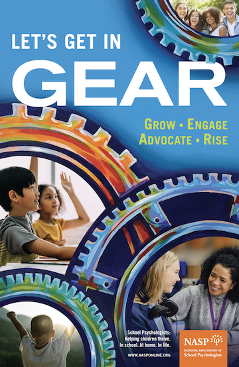 During the week of November 8–12, 2021 schools throughout the country celebrated National School Psychology Week to highlight the important work school psychologists do to help students thrive. This year’s theme is “Let’s Get in GEAR.” (Grow, Engage, Advocate, Rise). The theme’s acronym provides a challenge to grow both personally and professionally. It encourages us to engage in best practices and advocate for children’s access to mental health and learning supports. To rise implies resilience and renewal despite the challenges of the past. This has a particular resonance this year as we work to help students, families, and school staff emerge from the challenges of the past year and a half. When we get in gear, we move together. When one gear moves, the gears connected to it move as well. When we move together there is a positive synergy that builds and becomes greater than any single effort. Getting in GEAR together can help us set goals for growth, engage in action steps, advocate for needs, and raise our voices in discussions to create the connections necessary for students to develop critical academic and social emotional skills.
During the week of November 8–12, 2021 schools throughout the country celebrated National School Psychology Week to highlight the important work school psychologists do to help students thrive. This year’s theme is “Let’s Get in GEAR.” (Grow, Engage, Advocate, Rise). The theme’s acronym provides a challenge to grow both personally and professionally. It encourages us to engage in best practices and advocate for children’s access to mental health and learning supports. To rise implies resilience and renewal despite the challenges of the past. This has a particular resonance this year as we work to help students, families, and school staff emerge from the challenges of the past year and a half. When we get in gear, we move together. When one gear moves, the gears connected to it move as well. When we move together there is a positive synergy that builds and becomes greater than any single effort. Getting in GEAR together can help us set goals for growth, engage in action steps, advocate for needs, and raise our voices in discussions to create the connections necessary for students to develop critical academic and social emotional skills.
After what has been a long and challenging year for many, students and adults alike find themselves stuck in a rut or even regressing. We hope to connect students and staff to show that if they “Get in GEAR” together, it can lead to substantial positive change for all involved. Central to this theme is the importance of the relationships between all students, staff, faculty, and parents within a school building. This theme is perfect for any school that is actively looking to positively impact their school climate. Please visit the NASP’s Suggested Activities for Working with Students and Adults webpage https://www.nasponline.org/research-and-policy/advocacy/national-school-psychology-week-(nspw)/poster-activities for ideas to help you and your students thrive.
To find your building’s school psychologist, visit https://aps2016.apsva.us/student-services/psychological-services/.
Mental Health Corner  SOS – Signs of Suicide Program
SOS – Signs of Suicide Program

During the months of October, November, December, Arlington Public Schools will be implementing a depression awareness and suicide prevention training to all eighth and tenth grade students as part of the SOS Signs of Suicide® Prevention Program. The program encourages students to seek help if they are concerned about themselves or a friend. The SOS Program is the only youth suicide prevention program that has demonstrated an improvement in students’ knowledge and adaptive attitudes about suicide risk and depression, as well as a reduction in actual suicide attempts. Listed on Substance Abuse and Mental Health Services Administration’s National Registry of Evidence-based Programs and Practices, the SOS Program has shown a reduction in self-reported suicide attempts by 40-64% in randomized control studies (Aseltine et al., 2007; Schilling et al., 2016).
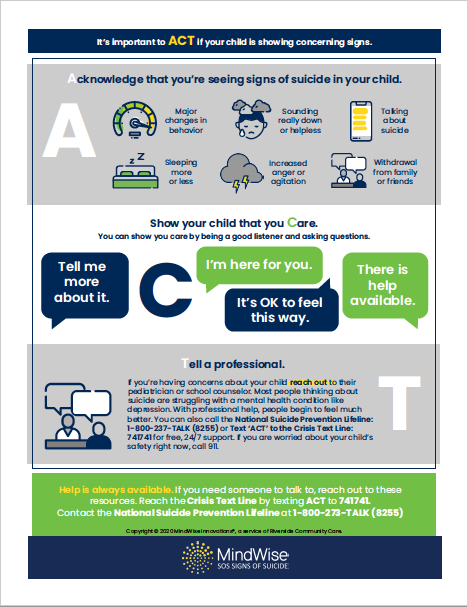 The goals in participating in this program are straightforward:
The goals in participating in this program are straightforward:
- To help our students understand that depression is treatable
- To explain that suicide is a preventable tragedy that often occurs as a result of untreated depression
- To train students how to identify potential signs of depression and suicide risk in themselves or a friend
- To impress upon youth that they can help themselves or a friend by taking the simple step of talking to a trusted adult about their concerns
- To teach students who they can turn to at school for help, if they need it
During these three months, our Student Services Team will present the program to all 8th grade and 10th grade students. The program includes a SOS video which encourages students to ACT (Acknowledge, Care, Tell) when concerned about themselves or a friend. After viewing the video, students will participate in a group discussion and will complete a depression screener. During this program, your student will be introduced to adults who can help in the building and can request a same-day confidential appointment. To learn more about SOS lesson, please watch the video below
LEARN MORE: Child & Family Services Parent Support Group Sessions
The Arlington Child and Family Services clinical staff is hosting Parent Support group sessions this fall on Tuesdays at 7 p.m. Join other parents in your community to share experiences and learn about topics relevant to your family each week! The next session is titled Managing Holiday Stress and will take place on November 16. Come support other parents and share your successes and lean in for support! Send any questions to [email protected]. For information about Arlington County Spanish Speaking Parent Support Group, please email Norma Jimenez at [email protected].
LEARN MORE: Arlington Parent Support Groups (NAMI)
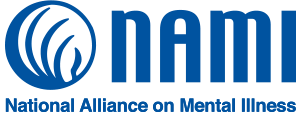 These groups are geared to parents whose child is experiencing symptoms of a mental illness, including: depression, anxiety, eating disorders, mood disorders and more. No diagnosis is required to participate. Participants are given the opportunity to share their story, experience support, and glean guidance (as desired) from group members regarding both community and school resources. Confidentiality is respected.
These groups are geared to parents whose child is experiencing symptoms of a mental illness, including: depression, anxiety, eating disorders, mood disorders and more. No diagnosis is required to participate. Participants are given the opportunity to share their story, experience support, and glean guidance (as desired) from group members regarding both community and school resources. Confidentiality is respected.
Parents of School Age Students and Teens (PK-12): Sundays 7pm-8:30pm (Upcoming 11/21 and 12/5) Cherrydale Baptist Church, 3910 Lorcom Lane, Arlington, VA 22207 – Building Entrance 16, Rm 118
Older Teen and Young Adults: 3rd Sunday 1-3pmTrinity Presbyterian Church, 5533 16th St N, Arlington, VA 22207
Questions?? Contact:
- PK-12: Michelle Best ([email protected])
- Adults: Naomi Verdugo ([email protected])
- Both: Alisa Cowen ([email protected])
LEARN MORE: Student Services Advisory Committee Invites YOU to learn more about SEL
Tuesday, November 16, 2021: 7pm ZOOM (details below)
The Student Services Committee invites you to their monthly meeting, featuring guest speakers Dr. Christina Choi and Peck Choi. Dr. Christina Choi is an author and presenter who appears regularly on TV and was the host of a very successful TV talk show in South Korea. She has made more than a dozen TV documentaries on marriage, parenting & education. Her TV documentary on motherhood received a Best Program award, and she was chosen as one of the three most influential women in Korea. She is currently working on a miniseries with EBS, which is an equivalent of PBS in the U.S. Dr. Choi and her husband, Peck Choi, will be talking to the committee about how they are making Social Emotional Learning a part of the culture.
Join the Zoom Meeting at: https://us02web.zoom.us/j/86517661396?pwd=NnZqdTNDNlRmb010N1VxMWNLNXVDZz09
Meeting ID: 865 1766 1396 Passcode: 987123
Find your local number: https://us02web.zoom.us/u/kcjJFLutqO
If you have any questions or need assistance joining the Zoom call, please email Alisa Cowen at [email protected]. If you have any questions about the speakers, please email [email protected].
LEARN MORE: Youth Mental Health First Aid Training Available to Staff & Parents
Youth Mental Health First Aid TrainingThe Office of Student Services continues to be committed to training all new staff and re-certifying staff in Youth Mental Health First Aid (YMHFA). This is a 6-hour course that teaches how to identify, understand, and respond to signs of mental illnesses and substance use disorders. Registration for staff is through Frontline. Parents can register by calling the Office of Student Services at 703-228-6062. Training will be provided every month for the remainder of the year.
Upcoming session dates are: November 16, December 1, January 13, February 8, March 10, March 31, April 27, and May 10.
LEARN MORE: What can YOU do to prevent child abuse?
Arlington County, Child Advocacy Center offers Child Abuse Prevention Training. All courses are offered in English or Spanish on an ongoing basis throughout the year. Currently, all training sessions are offered virtually to ensure the health and safety in our community. For additional information about registering for one of these sessions, please visit the following link: https://www.signupgenius.com/go/20F0A45ACA829A6FD0-stewards1
Resources: CIGNA School Support Line – OPEN TO ALL
Don’t do it alone. There are many reasons to seek help. Some are common, others more serious. Either way, talk with us today if you or a family member are dealing with: Anxiety, Depression, Abuse, Eating disorders, Bullying, Self-harm, Addiction, Peer Pressure, Suicidal thoughts or anything else. No one has to be a Cigna customer to call. If you go to school, or have a child who goes to school, the School Support Line was created for you.This is a no-cost, confidential service that puts students and families in touch with mental health professionals who know how to listen, ask the right questions, and offer advice. And it’s available around the clock for you and for members of your family. 833-MeCigna (833-632-4462) We’re here 24/7/365!
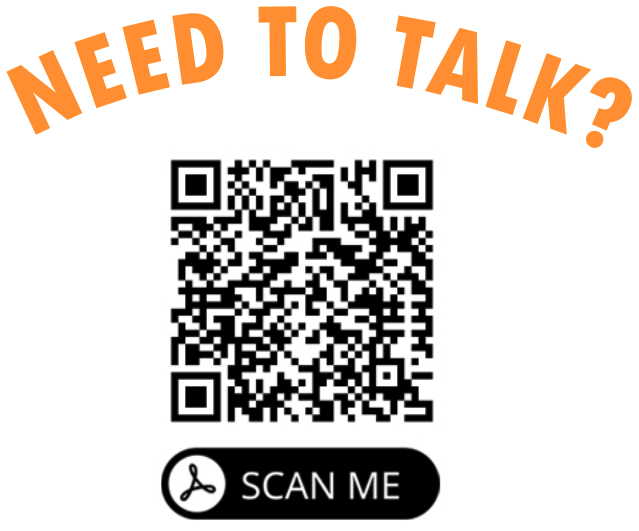
- School Support Line Spanish
- School Support Line Amharic
- School Support Line Arabic
- School Support Line Mongolian
- School Support Line English
Student Services Newsletter October 2021
In October, APS staff will continue to focus on the SEL theme of Relationship Skills through activities and lessons. We also recognize October as Bullying and Substance Abuse Prevention Month. We are offering several free trainings for parents to learn more about the new marijuana laws in Virginia, how to help prevent child abuse, and how to best support the mental health of youth.
SEL Focus: Relationship Skills
Demonstrate the ability to effectively collaborate and navigate relationships while valuing different and diverse perspectives, abilities, backgrounds, and cultures. Check out this short video about how relationship skills affect learning and how important it is to foster healthy communication.
PBSLEARNING – Relationship Skills – SEL
October is Bullying Prevention Month
Recognize, Report, Refuse! October is National Bullying Prevention Month, a time to focus and raise awareness on bullying. Bullying is unwanted, aggressive behavior that involves a real or perceived power imbalance. The behavior is repeated, one-sided and happening on purpose. Bullying includes actions such as making threats, spreading rumors, attacking someone physically or verbally, and excluding someone from a group on purpose. Bullying can also take place through technology, known as cyberbullying. Examples of cyberbullying include mean text messages or emails, rumors sent by email or posted on social networking sites, and embarrassing pictures, videos, websites, or fake profiles.
Childhood bullying is a significant problem nationwide. It can cause school absenteeism, mental and physical stress, poor school performance, poor self-esteem, and in some cases, school violence. Students who experience bullying are at increased risk for depression, anxiety, sleep difficulties, lower academic achievement, and dropping out of school. Bullying can also happen online. Reports of cyberbullying among public school attending students are highest for middle school (33%), followed by high school (30%), combined schools (20%) and primary schools (5%). School board members, superintendents, teachers, and parents play a critical role in creating a climate where bullying is not tolerated. It has been proven when adults and children stand together, bullying ends.
APS teaches bullying prevention to educate and empower students to help create safe and supportive school communities. Throughout this month, counselors will engage in various bullying prevention efforts such as; reinforcing the three Rs of bullying prevention, Recognize, Report and Refuse, participating in Wear Orange Unity Day to show unity for kindness, support, and inclusion, and spreading the Upstander Pledge, a commitment to standing up for others. Everyone can do something to help prevent bullying; individuals, schools, and communities each have an important role. Learn what you can do. APS provides a host of resources and helpful FAQs surrounding bullying. View this short video about our efforts. https://aps2016.apsva.us/student-services/bully-prevention/
Rules to help everyone feel safe & respected
- Recognizing bullying – hurtful behavior that is repetitive and one-sided
- Reporting bullying – identifying trusted adult you can talk to
- Refusing bullying – use assertiveness skills
- Bystander power – people who see or know about bullying happening
- Bystander responsibility – you can choose to help stop the bullying
- Bystanders to Cyberbullying – Recognize, Refuse, and Report bullying online
UNITY DAY: Wednesday October 20, 2021 WEAR & SHARE ORANGE
Show unity for kindness, acceptance, and inclusion and to send a visible message that no child should ever experience bullying.
National Substance Abuse Prevention Month
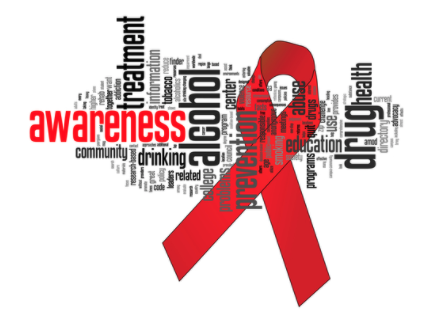 Join teens, parents, teachers, and other citizens across America @RedRibbonWeek (October 23-31) #RedRibbonWeek #DrugFreeLooksLikeMe
Join teens, parents, teachers, and other citizens across America @RedRibbonWeek (October 23-31) #RedRibbonWeek #DrugFreeLooksLikeMe
October was first declared as National Substance Abuse Prevention Month in 2011. Since then, October has been a time to highlight the vital role of substance abuse prevention in both individual and community health and to acknowledge those in recovery, as well as children, parents, family, and friends supporting them. Studies show that the earlier an individual starts smoking, drinking or using other drugs, the greater the likelihood of developing addiction. 9 out of 10 people who abuse or are addicted to nicotine, alcohol or other drugs began using these substances before they were 18. People who began using addictive substances before age 15 are nearly 7 times likelier to develop a substance problem than those who delay first use until age 21 or older. Every year that substance use is delayed during the period of adolescent brain development, the risk of addiction and substance abuse decrease. During this month, we take the time to recognize national and community efforts to decrease substance misuse and addiction. We also gather to remember those who have lost their lives to addiction. October is also a time to celebrate recovery and show support to children, parents, family, and friends, who are directly impacted by the disease of addiction.
Each year, the Arlington County Public Schools Substance Abuse Counseling (SAC) team commemorates National Substance Abuse Prevention Month by recognizing Red Ribbon Week, which is the Nation’s oldest and largest drug prevention campaign, which pays tribute to DEA Special Agent Enrique “Kiki” Camarena, who was killed in the line of duty. This prevention-based initiative is celebrated annually during the last week of October, and it reaches millions of individuals across the world. During this time, the SAC team recognizes Red Ribbon Week by engaging our students across the county and providing them with educational materials, giveaways, and interactive activities. Learn more here – APS Substance Abuse Counselors
LEARN MORE: Marijuana is Legal, So What Now?
With the recent legalization of marijuana in the State of Virginia, concerns have emerged about the overall understanding of the law and the potential long-term impact this may have on our adolescent and adult population. This presentation was created to give our audience an overall understanding of the legislation and to obtain some useful information about misconceptions about marijuana with a peer to peer perspective as well.
Presented by: Jenny Sexton MA, CSAC, FAC, QMHP, CSAM Substance Abuse Counselor from Arlington Public Schools, Niasha John, Juvenile Domestic Relations Court Services Unit, Probation and Substance Use Counselor and Teen Network Board.
Thursday, October 19th, 2021 at 12:00 pm or 6:00 pm
REGISTER HERE – https://www.eventbrite.com/e/marijuana-is-legal-so-what-now-tickets-182792907507?aff=erelexpmlt
LEARN MORE: What can YOU do to prevent child abuse?
Arlington County, Child Advocacy Center offers Child Abuse Prevention Training. All courses are offered in English or Spanish on an ongoing basis throughout the year. Currently, all training sessions are offered virtually to ensure the health and safety in our community. For additional information about registering for one of these sessions, please visit the following link: https://www.signupgenius.com/go/20F0A45ACA829A6FD0-stewards1
LEARN MORE: Youth Mental Health First Aid
Social-emotional learning is a priority for APS and this course will teach skills for self-awareness and relationship skills in the aspects of recognizing potential mental health needs, managing your own feelings, and how to have conversations with those who may need to be connected to mental health services. Through this course, participants will gain the skills to recognize and support youth experiencing a mental health or substance abuse challenge or crisis. The course covers common signs and symptoms of mental illness in youth, including: anxiety, depression, eating disorders. attention deficit hyperactivity disorder (ADHD); common signs and symptoms of substance use; how to interact with a child or adolescent in crisis; how to connect the person with help. NEW: Expanded content on trauma, addiction and self-care and the impact of social media and bullying. Participants will complete a 2-hour, self-paced online class, then participate in a 4- to 5-hour Instructor-led live, in-person training. The course is offered monthly throughout the school year and is available to staff and parents. The next session will be October 28th, 2021. Parents who wish to participate may register by calling Student Services at 703-228-6062 or emailing [email protected] or [email protected].
Mental Health Corner
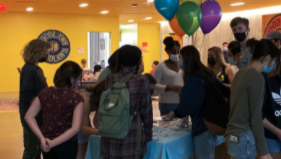 Sources of Strength Peer Leaders at HB Woodlawn hosted a school-wide event to recognize National Suicide Prevention Month. Students worked with Siobhan Bowler, their APS Substance Abuse Counselor, to educate the community about risk and protective factors related to suicide prevention.
Sources of Strength Peer Leaders at HB Woodlawn hosted a school-wide event to recognize National Suicide Prevention Month. Students worked with Siobhan Bowler, their APS Substance Abuse Counselor, to educate the community about risk and protective factors related to suicide prevention.
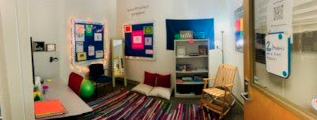 The W-L School Counseling department designed a “calm room” located inside the counseling suite to help students eliminate stress during the school day. The goal is to continue to build a “positive school community” and “provide skills for resilience.”
The W-L School Counseling department designed a “calm room” located inside the counseling suite to help students eliminate stress during the school day. The goal is to continue to build a “positive school community” and “provide skills for resilience.”
Arlington Department of Human Services (DHS) Community Resources
APS collaborates with our agency colleagues in the Department of Human Services (DHS) to provide services and build capacity across our community. An example of this collaboration is a newsletter, “Building Healthy Communities” where many opportunities for parents and community members are highlighted each month.
Student Services Newsletter September 2021
This year APS will have a SEL focus each month. A different SEL competency and overarching concept will be addressed in classrooms with lessons and activities, and we encourage you to work with your students at home and in the community to further develop these social and emotional skills. Suggesting questions and activities will be provided each month in this newsletter.
Social-Emotional Learning (SEL)
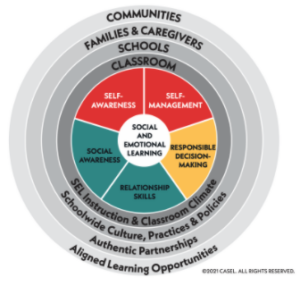 This past July, the Virginia Department of Education established a uniform definition of social emotional learning based on the Collaborative for Academic, Social, and Emotional (CASEL) definition:
This past July, the Virginia Department of Education established a uniform definition of social emotional learning based on the Collaborative for Academic, Social, and Emotional (CASEL) definition:
“Social and emotional learning is the process through which all young people and adults acquire and apply the knowledge, skills, and attitudes to develop healthy identities, manage emotions and achieve personal and collective goals, feel and show empathy for others, establish and maintain supportive relationships, and make responsible and caring decisions.”
Virginia’s vision for SEL is intended to center equity in this work which is key to VDOE’s vision and mission, and aligns without priorities in APS as well. The Virginia definition was intentionally created to include adults as well as students. Social emotional learning is important for all of us to become better human beings. You can find more information about the VDOE SEL standards here – VDOE Social Emotional Learning (SEL)
Over the summer, a team of school counselors, social workers, and psychologists, worked on several projects to align our SEL curriculums and tiers of support with the new standards. They also created staff SEL Canvas pages to support the implementation of SEL and the development of all APS staff.
This year APS will have a SEL focus each month. A different SEL competency and overarching concept will be addressed in classrooms with lessons and activities, and we encourage you to work with your students at home and in the community to further develop these social and emotional skills. Suggesting questions and activities will be provided each month in this newsletter.
September SEL Focus: Relationship Skills
Apply verbal and non-verbal communication and listening skills to interact with others, form and maintain positive relationships, and resolve conflict constructively.
Questions for Discussion (NOTE: Answers should be accepted with no judgement.)
- What are some things you can do with your body when someone is talking to show you are listening?
- What are some things you can say after someone has spoken to show that you heard them and are not judging them?
- What can you say and do when having a disagreement with a someone to show respect for yourself and them?
- Who would you talk to at home if…(you needed help, you made a bad choice, you have good news to share, etc.)? Who would you talk to at school…?
- Who is someone at home (and school) you want to be closer to? What can you do to make that happen?
- Who is an adult that you talked to at school today? Who will you talk to tomorrow?
Activities:
- Spend time together. Play games. Eat meals. Go on walks. Work on a puzzle. Read a book. Be intentional about the time you spend together, making sure that times allows for communication.
- Have one-on-one chats to build and strengthen individual relationships.
- Make decisions together about what to do for specials events such as birthdays and holidays.
- One minute shares. Allow everyone a minute to share on a topic of their choice. While someone is sharing everyone else is practicing active listening. (Eyes watching speaker, ears listening, voice quiet, body calm.) When speaker is finished, the listeners and share what they heard with no judgement. Example – So you are saying that you really did not have fun when we worked on the puzzle. Is that correct?
Healthy relationship skills are the ability to get along with others and make meaningful connections. Relationships take time to build and they can be difficult to develop and maintain. Learning and practicing the skills needed to build healthy relationships are life-skills that will help now and in years to come.
First 20 days of SEL
In line with the theme of relationship skills, each day during the first month of school, all staff will be focusing on connecting with their students and helping to foster connections among peers and the school community. Student Services has provided lessons and activities to be used in class for the “First 20 Days of School.” Lessons are taught at designated times in the class environment through social-emotional learning activities that build relationship skills in the class environment and/or support students in self-reflective practices.
September is Suicide Prevention Awareness Month
September is National Suicide Prevention Awareness Month—a time to share resources in an effort to shed light on this serious and often stigmatized topic. We use this month to raise awareness and connect individuals with resources and support. Suicidal thoughts, much like mental health conditions, can affect anyone regardless of age, gender or background. In fact, suicide is often the result of an untreated mental health condition. At this time, suicide is the second leading cause of death in people age 10-24. Suicidal thoughts, although common, should not be considered normal and often indicate more serious issues.
If you or someone you know is in crisis, please get help now. Access mental health resources by clicking the “Need to Talk?” Button on the APS District Webpage. In addition, all APS schools have a comprehensive mental health team, including counselors, school psychologists and social workers to support students and families in need.
https://aps2016.apsva.us/mental-health-services/in-crisis-need-help-now/
Youth Mental Health First Aid Training
The Office of Student Services continues to be committed to training all new staff and re-certifying staff in Youth Mental Health First Aid (YMHFA). This is a 6-hour course that teaches how to identify, understand, and respond to signs of mental illnesses and substance use disorders. Registration for staff is through Frontline. Parents can register by calling the Office of Student Services at 703-228-6062.Training will be provided every month for the remainder of the year starting on September 23, September 30, October 14, October 28, November 16, December 1, January 13, February 8, March 10, March 31, April 27, and May 10.
Resources
Children’s Regional Crisis Response (CR2)
- CR2 Provides 24- Hour rapid response to all youth (17 & younger) facing a mental health and/or substance use crisis. Their highly trained and compassionate counselors provide phone screening and face-to-face assessment, intervention, and support so that your child and family may continue with life as planned.
- Call for 24-Hour Crisis Services 844-627-4747Information: 703-257-5997
- Website: CR2crisis.com
In need of Emergency Mental Health Services? Call:
- Arlington Behavioral Healthcare ServicesEmergency Line: 703-228-5160 General Number: 703-228-1560
Worried your child may attempt suicide/self-harm? Not sure what to do? Call:
- Crisis Link Regional Hot Line: 703-527-4077 or Text: CONNECT to 85511
- National Hope Line: 1-800-SUICIDE (1-800-784-2433)
- LGBTQ Lifeline: 1-866-488-7386
- National Suicide Prevention Lifeline: 1-800-273-TALK (1-800-273-8255)
- SAMHSA National Helpline: 1-800-662-HELP (1-800-662-4357)
 Contact
Contact  Calendars
Calendars Careers
Careers Engage
Engage  District
District
